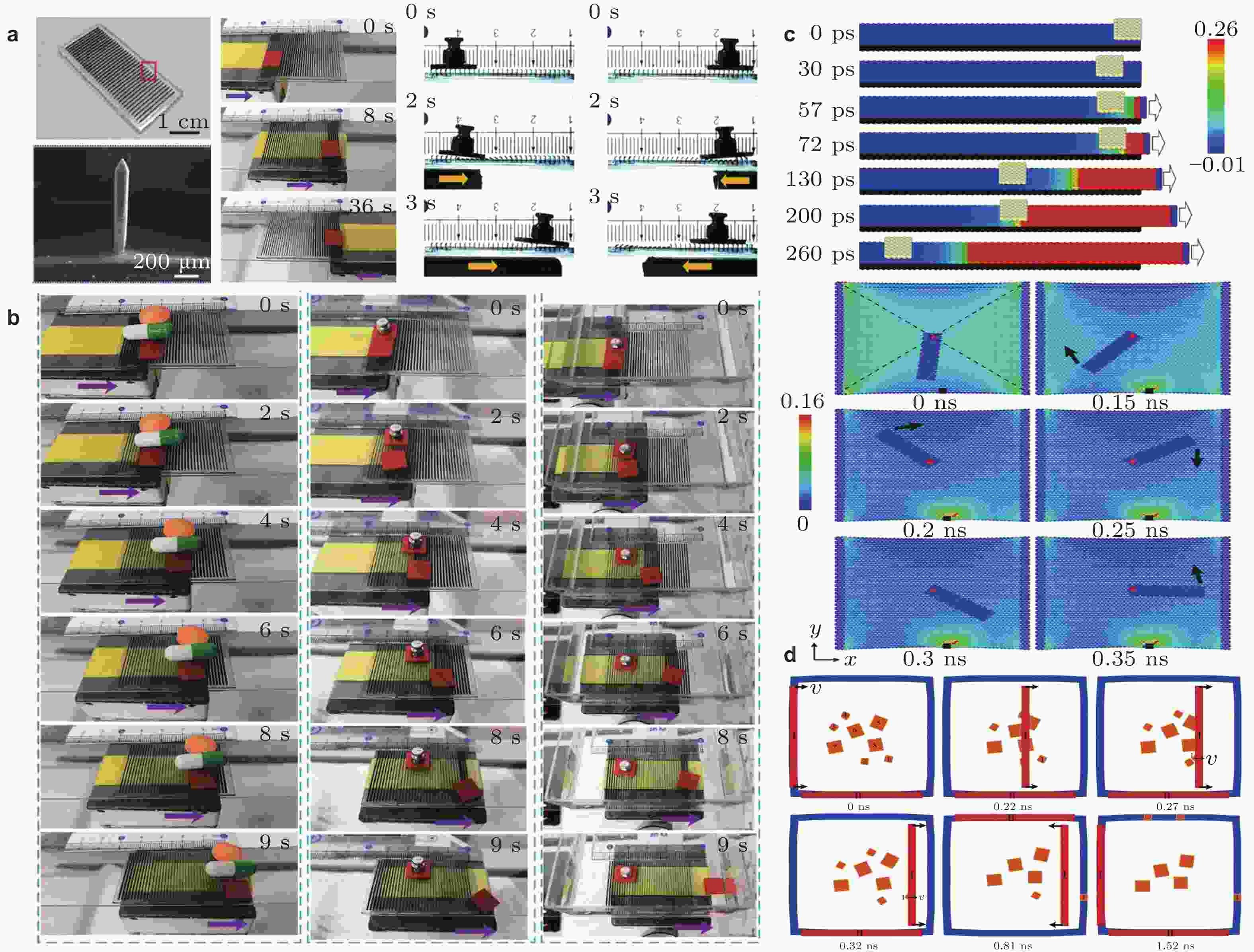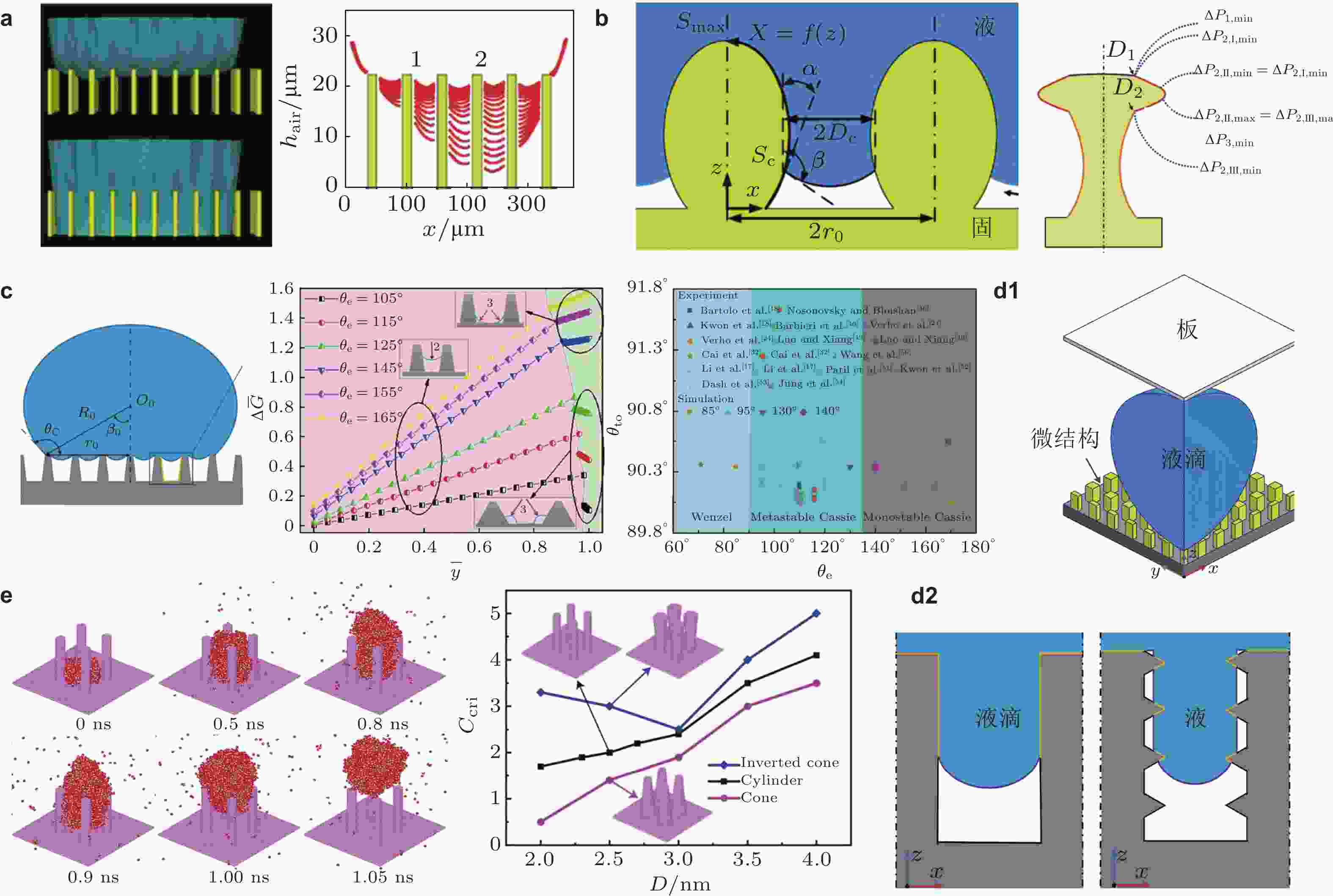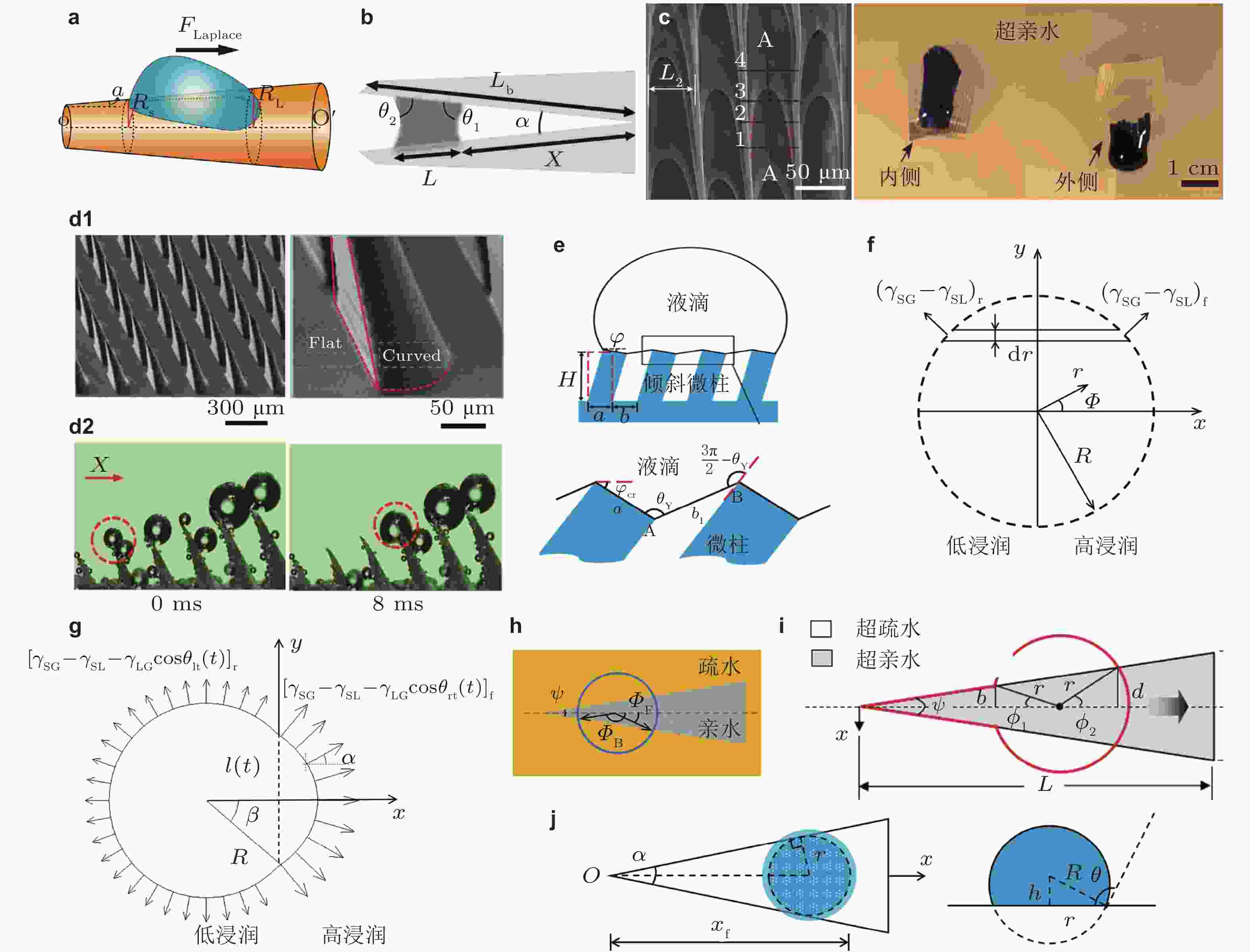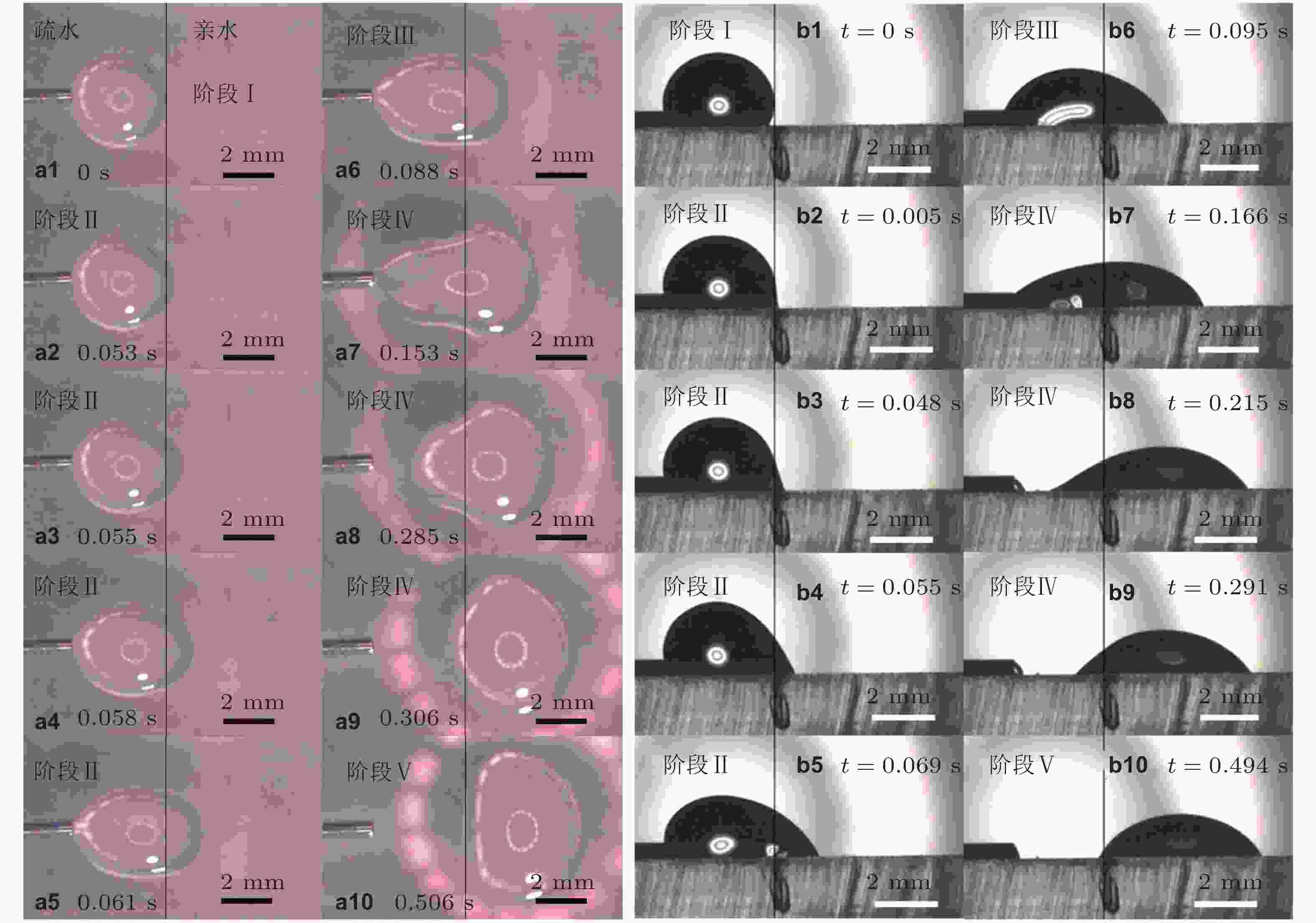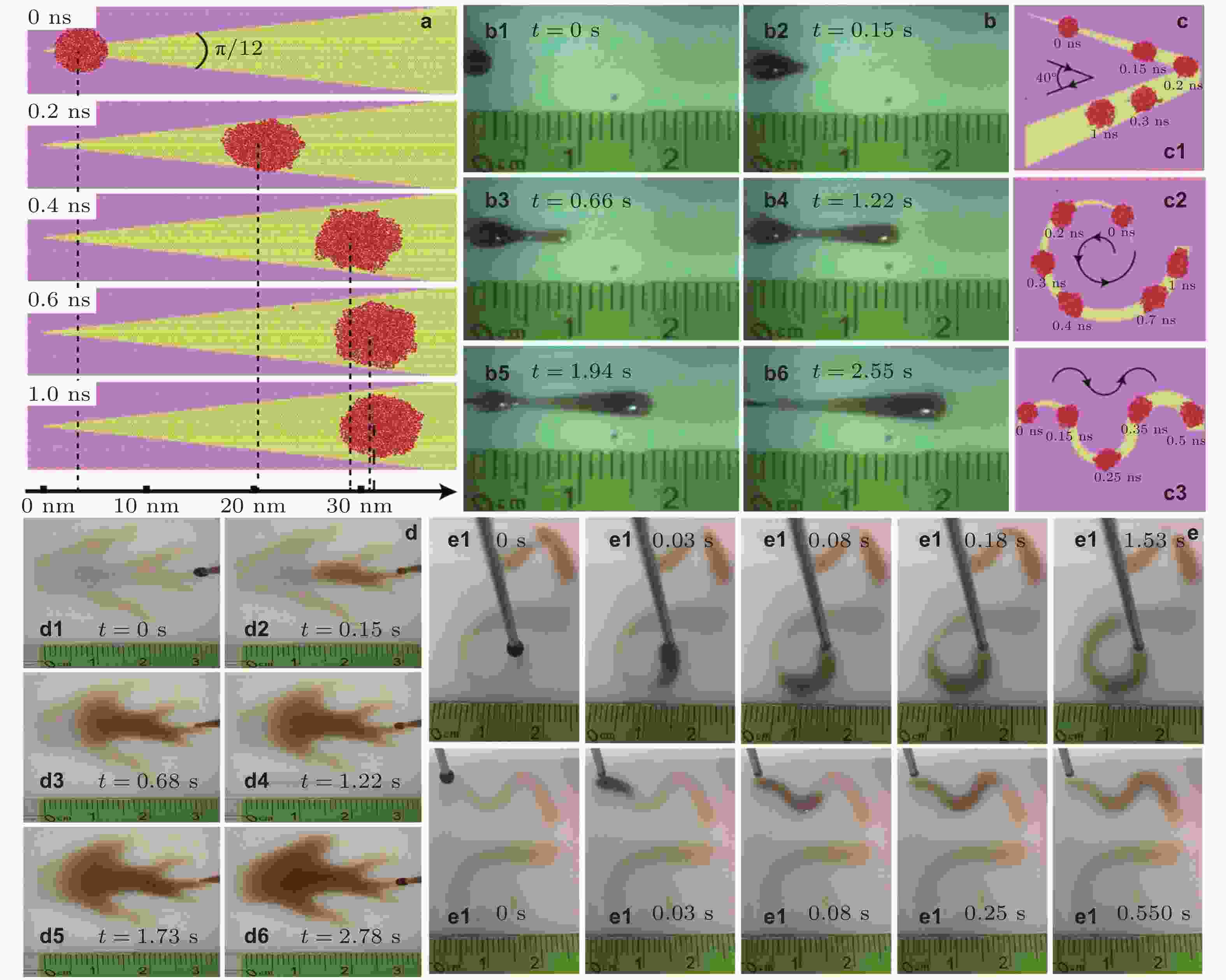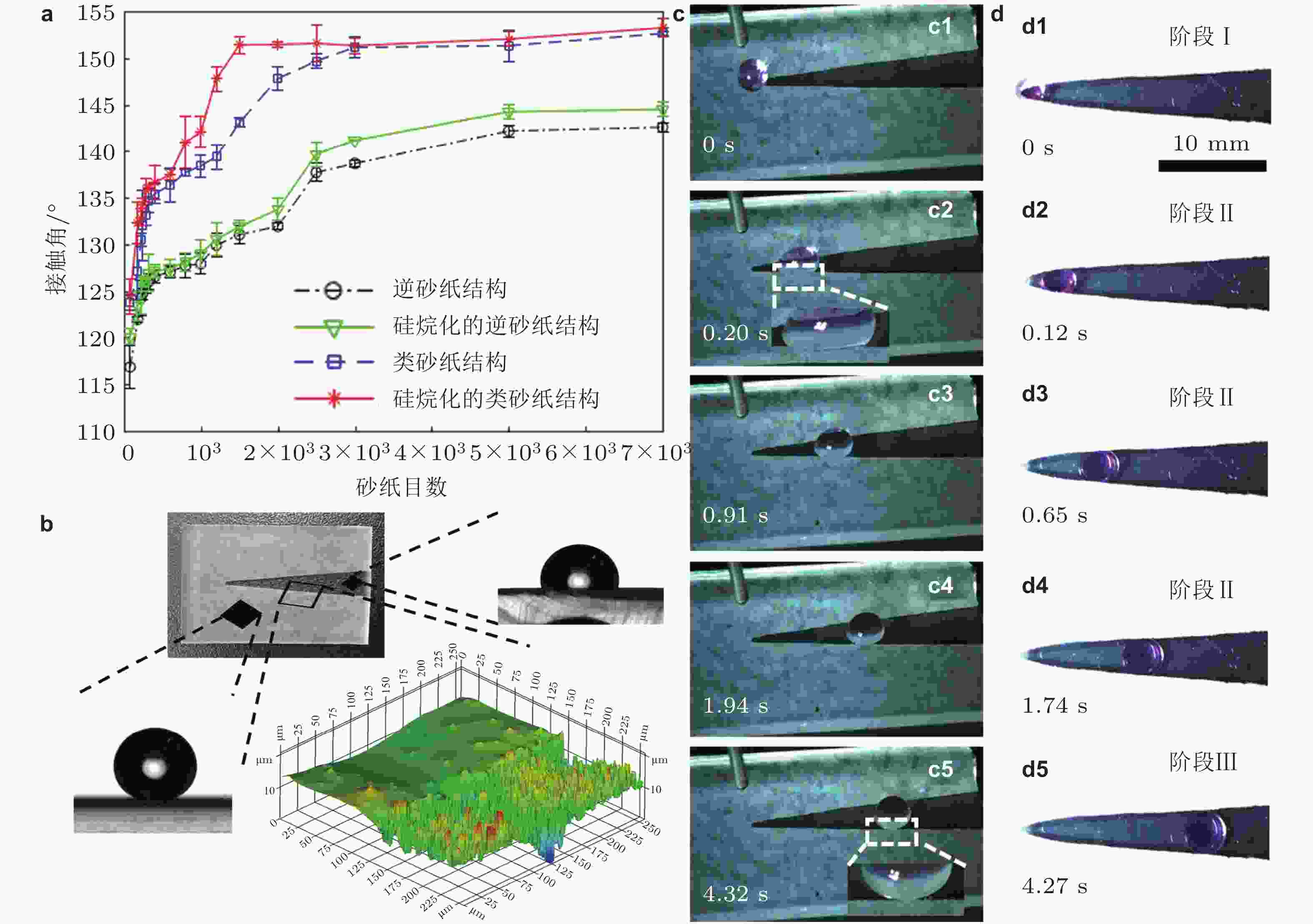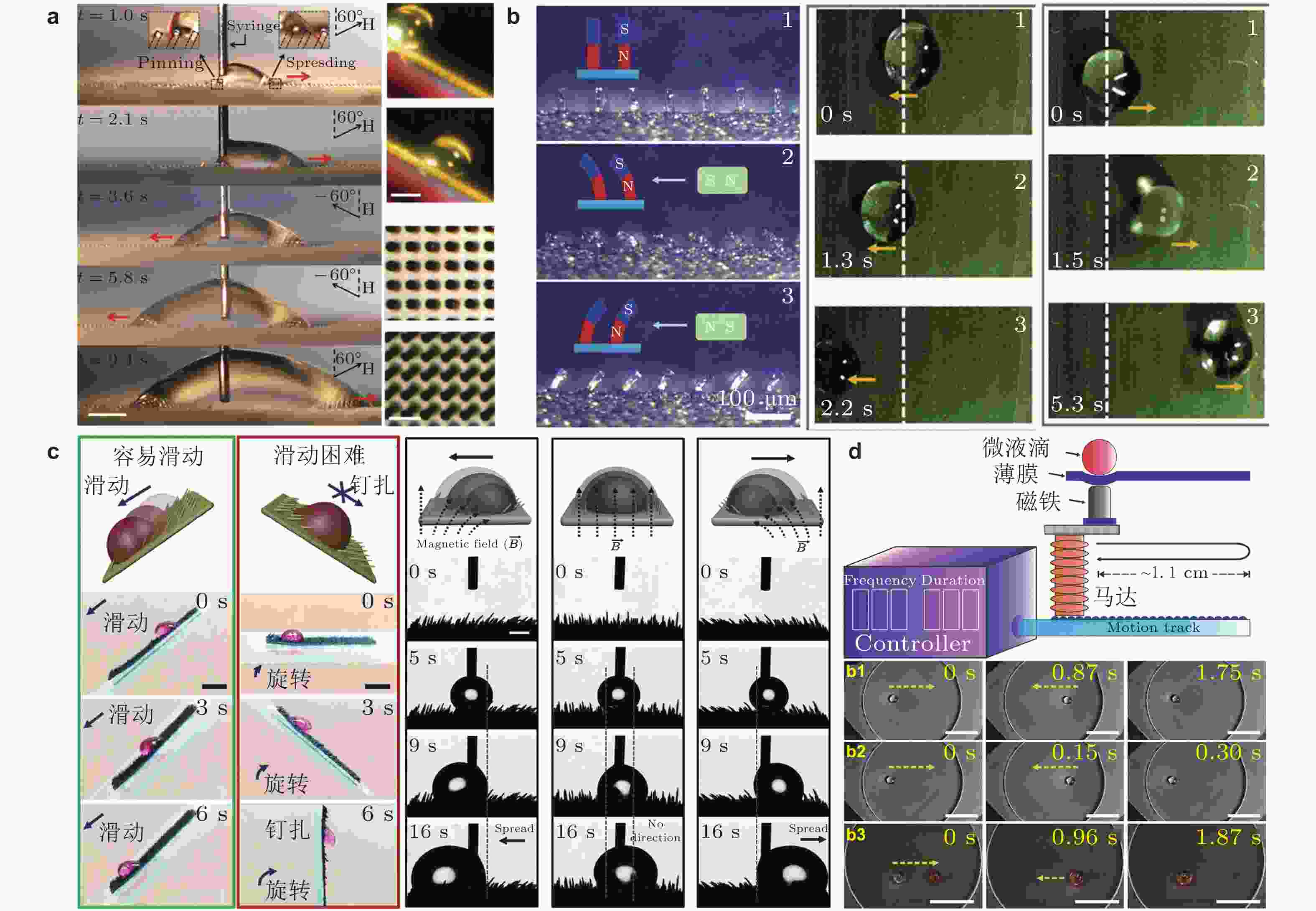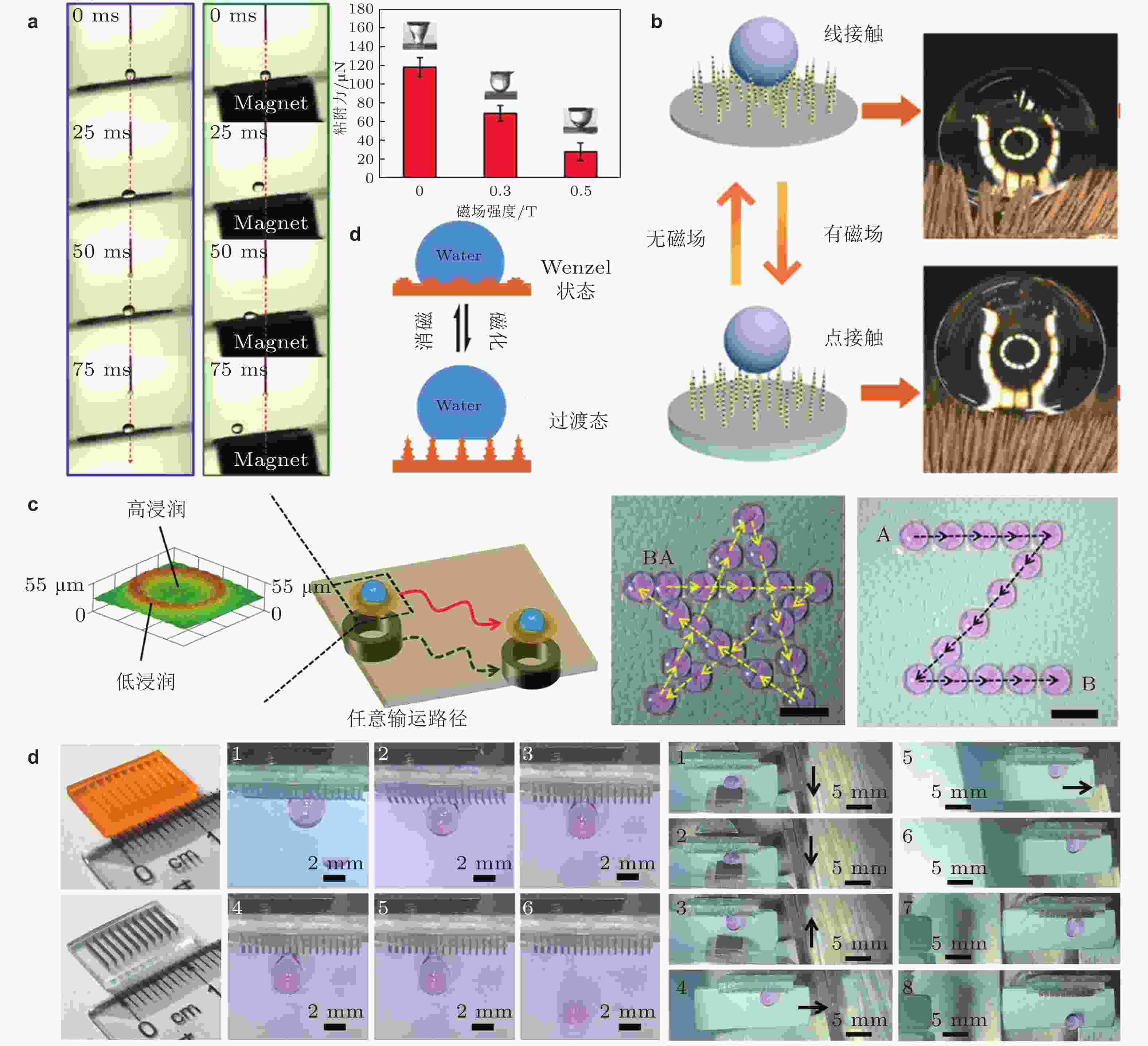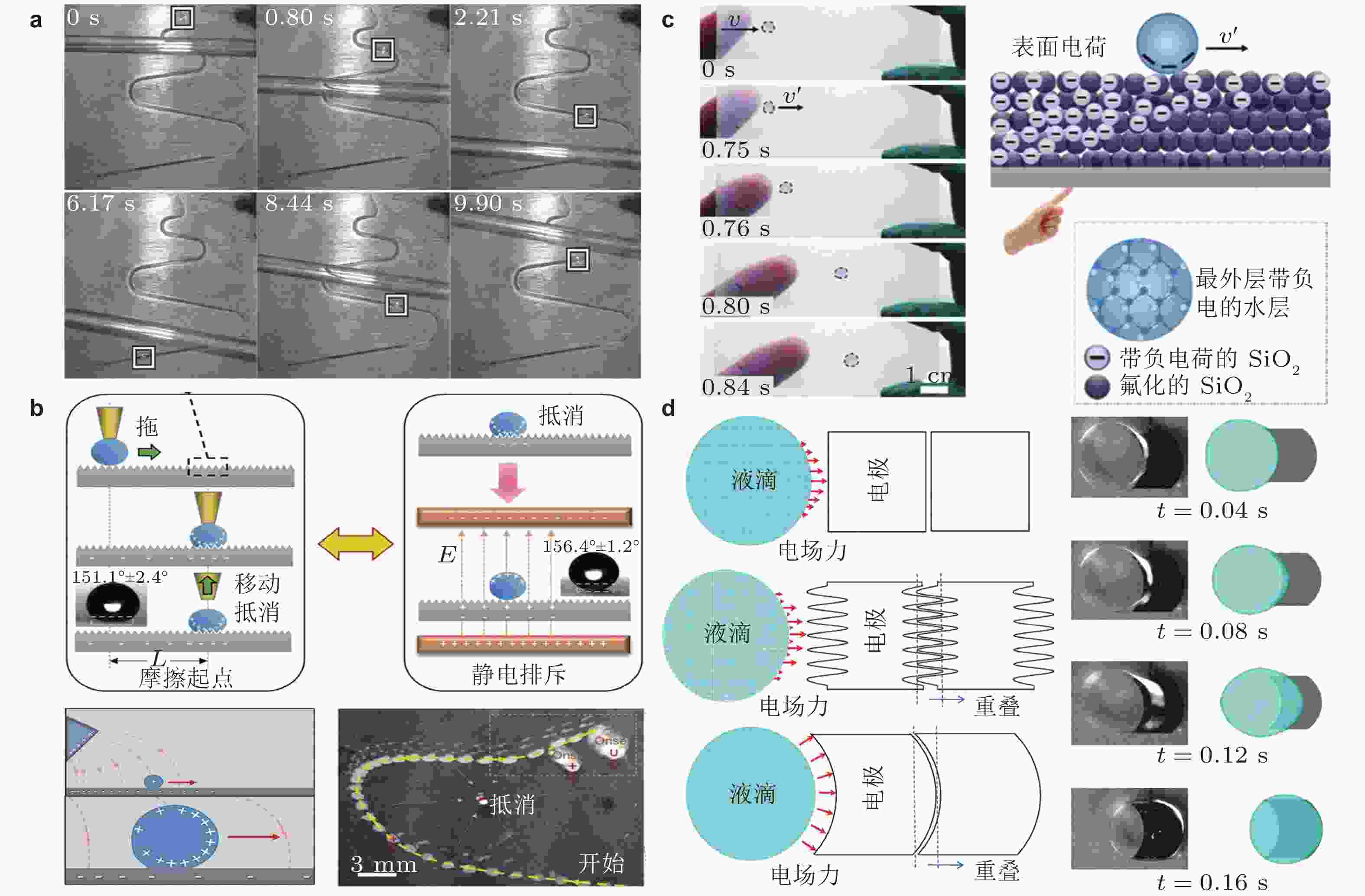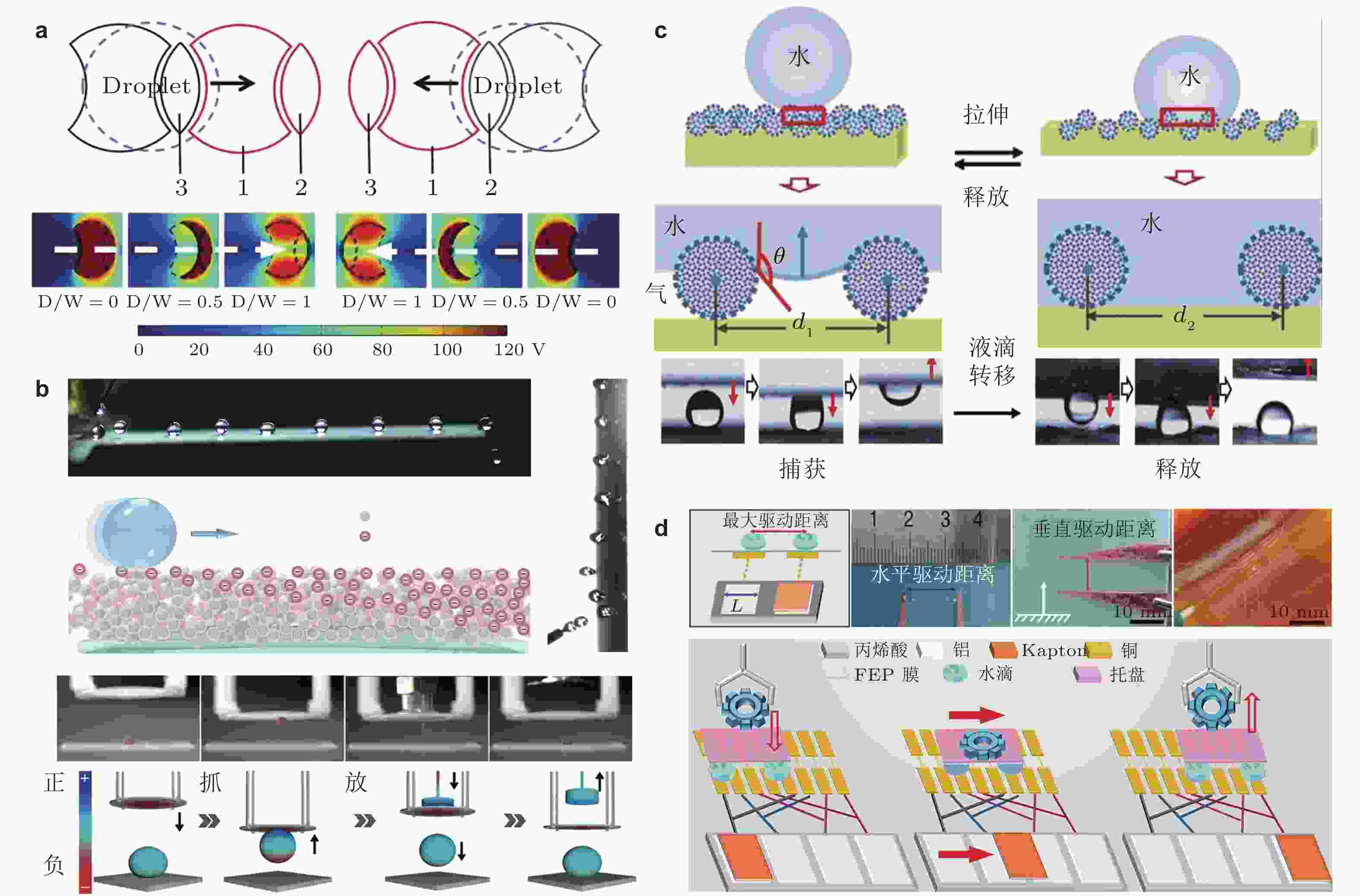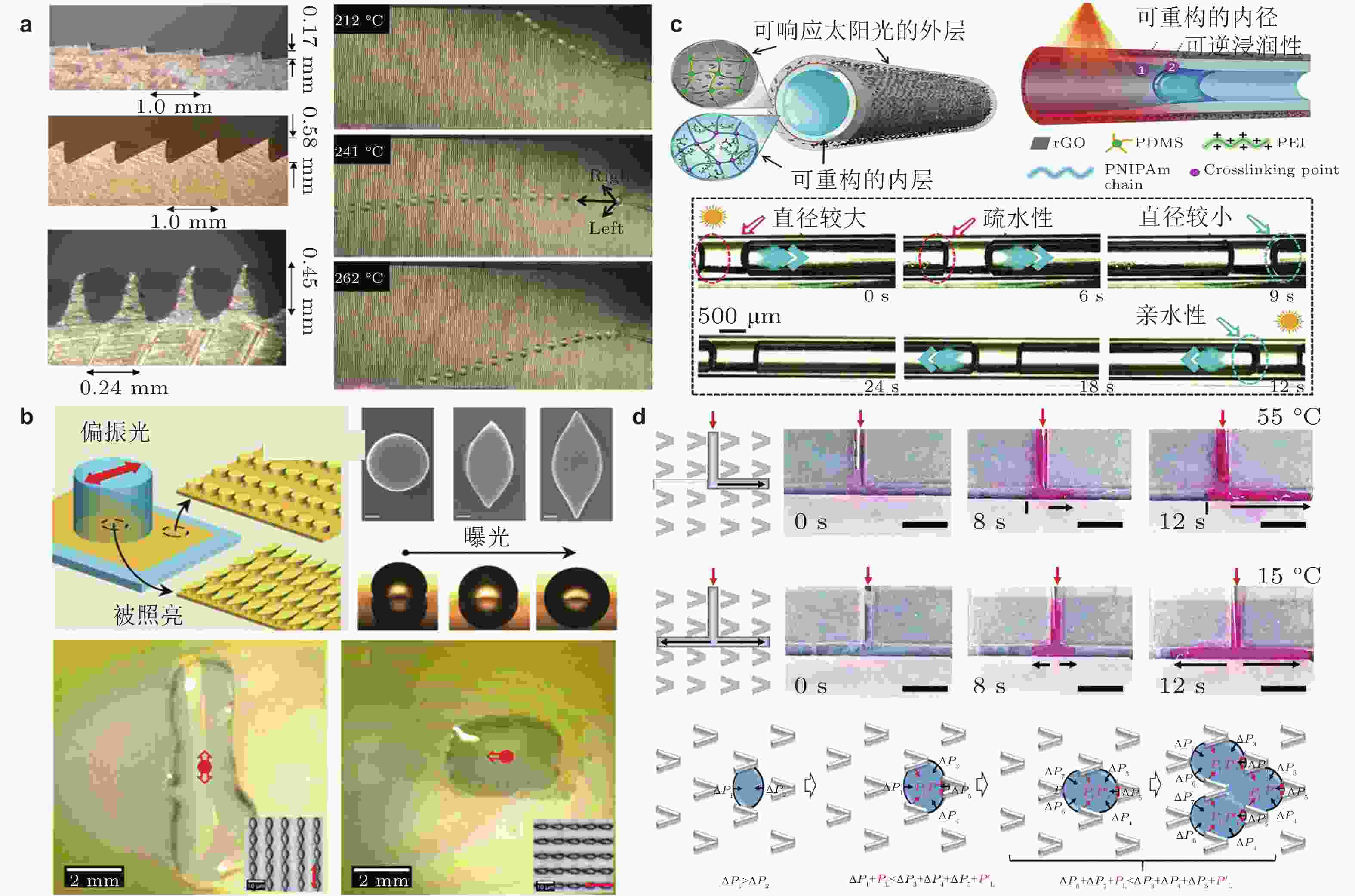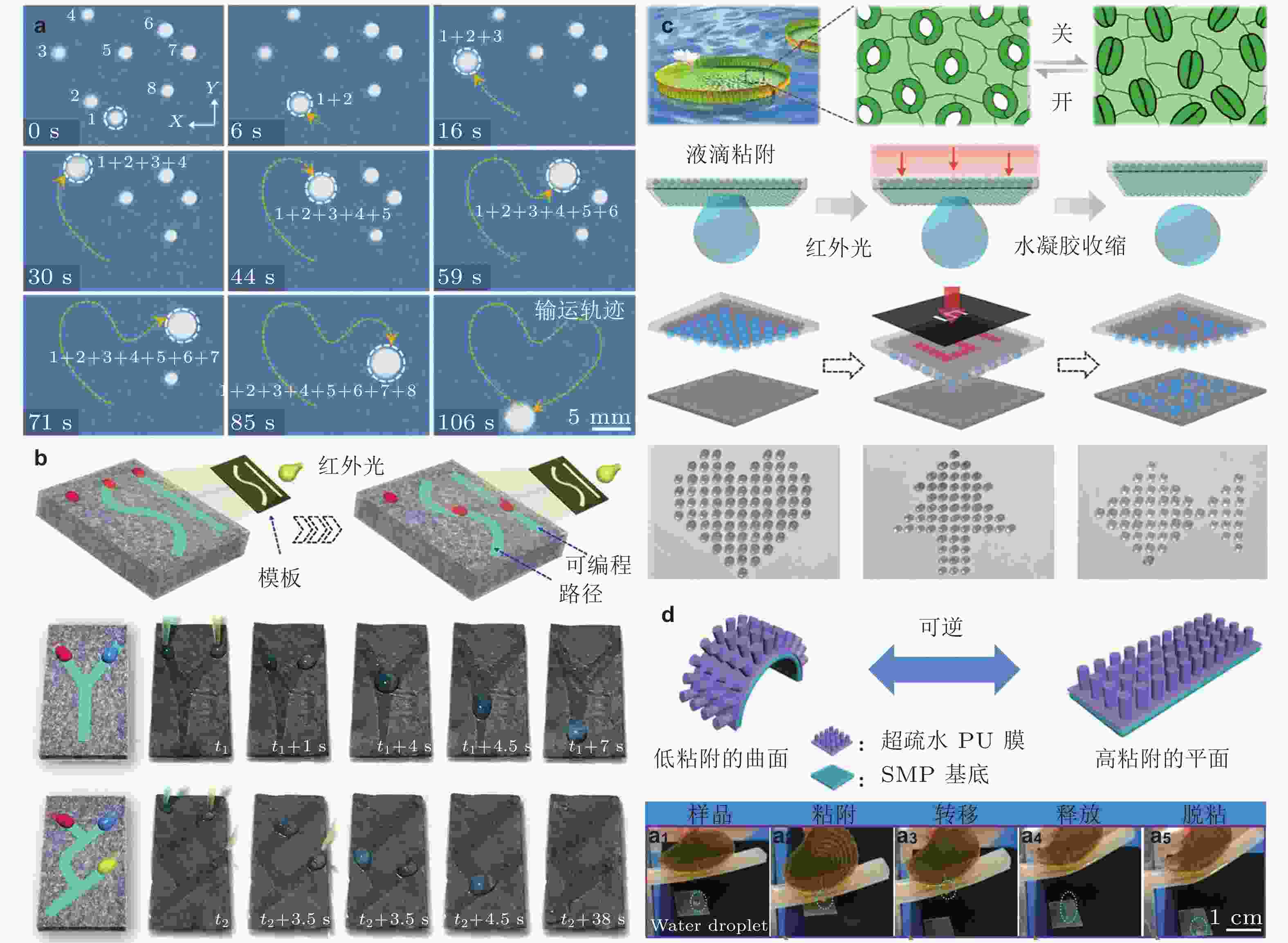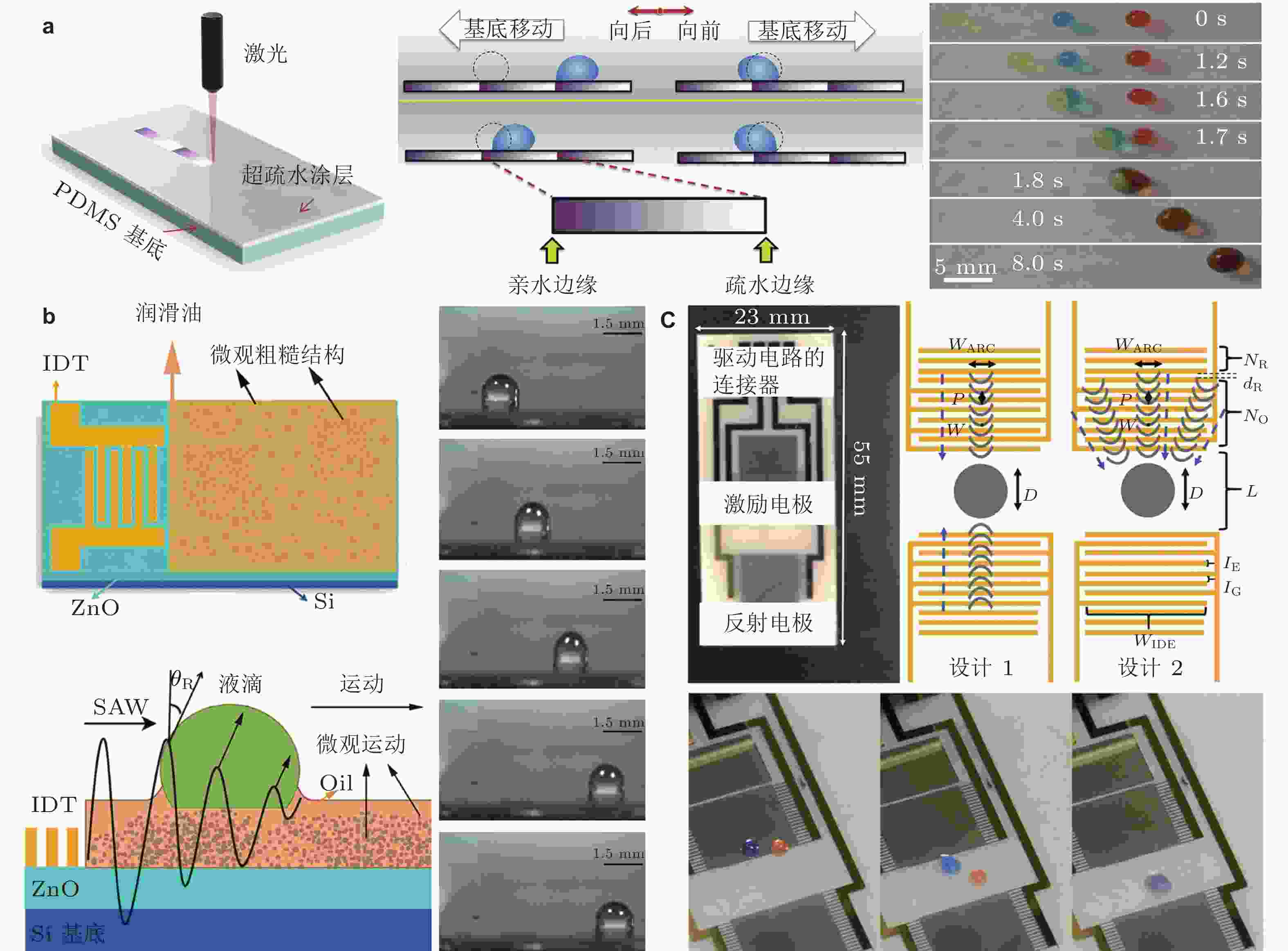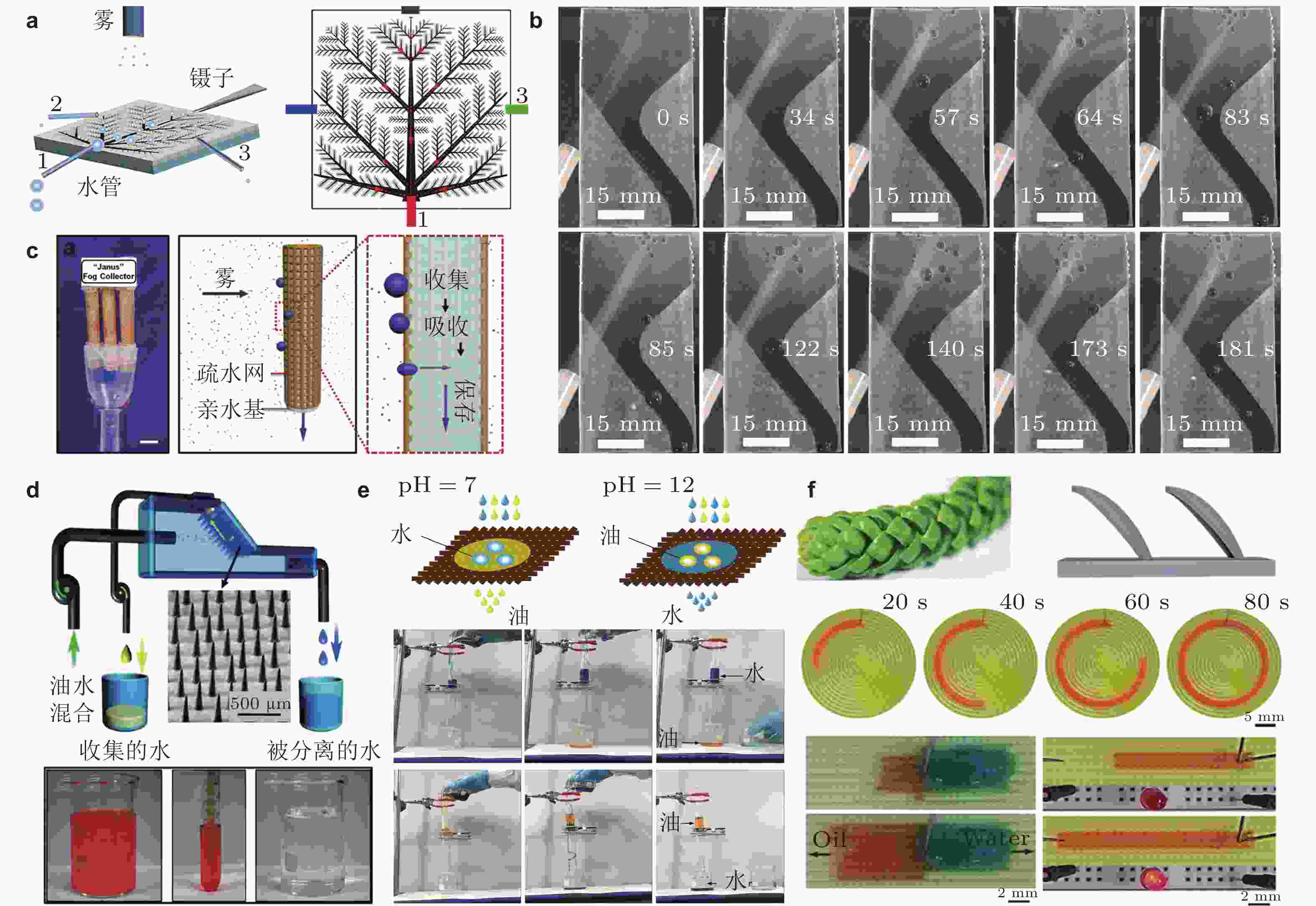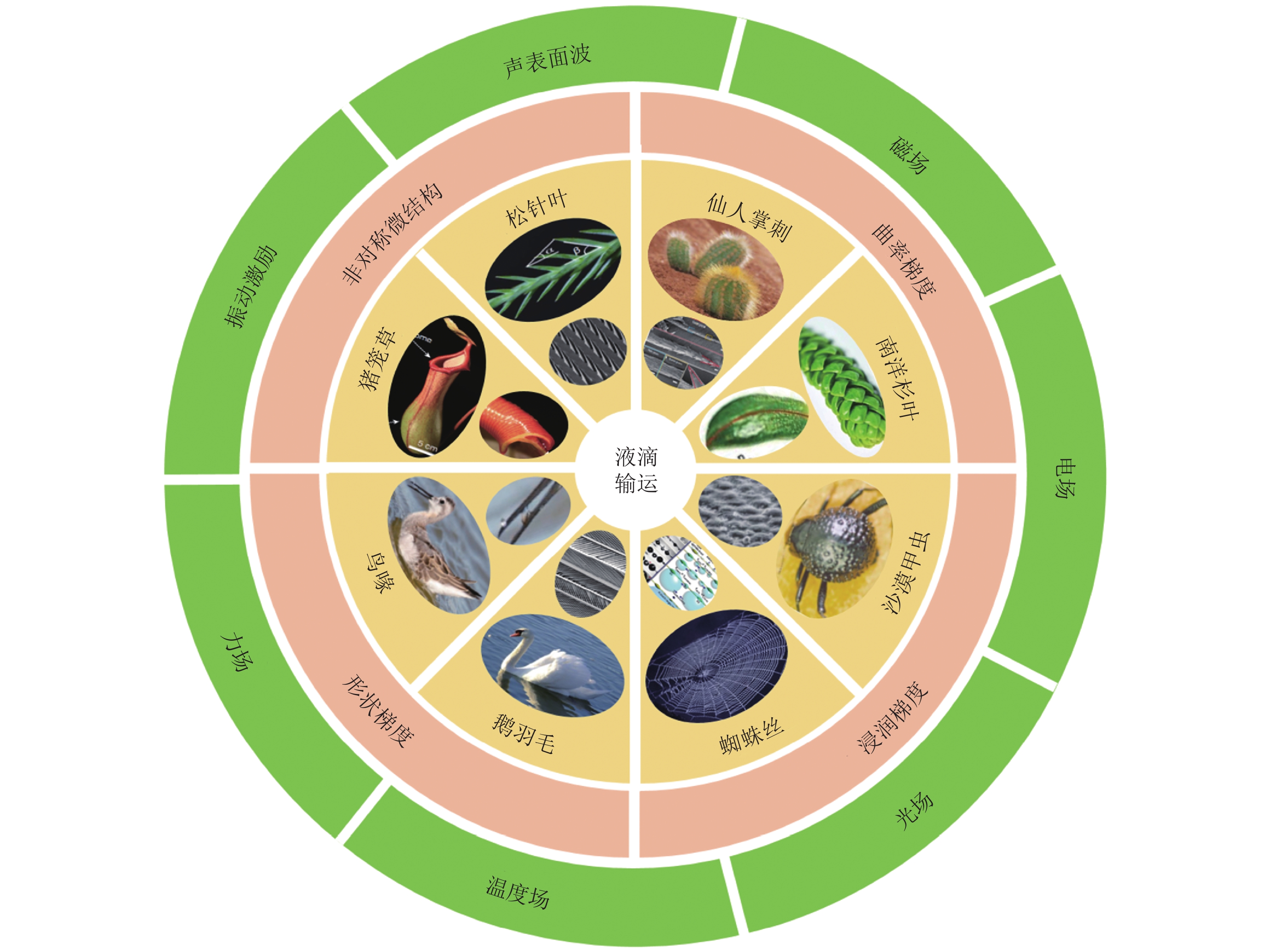Research progress of biomimetic design and preparation of functional surfaces for droplet transport
-
摘要: 液滴输运功能表面在绿色能源、医疗科技、新材料等领域具有重要应用, 例如雾中淡水收集、药物靶向治疗等. 自然界具有多种可实现液滴定向运输与定点转移的生物表面, 为液滴输运功能表面的设计与制备提供了绝美的范例, 已涌现出大量新颖的、巧妙的仿生设计研究成果. 本文首先概括总结了自然界具有自发输运液滴的典型生物体功能表面, 阐述了表征固体表面浸润性相关的基础理论; 其次, 综述了不同自驱动机制下液滴输运功能表面的仿生研究进展, 对比分析了不同功能表面的液滴自驱动机理及影响因素; 进一步分类阐述和分析了磁场、电场、温度场等外场调控实现液滴定向运输或定点转移功能表面的研究现状; 最后归纳总结了此类仿生功能表面在实际工程中的应用, 并对该方向的研究前景和发展趋势提出展望.Abstract: Functional surfaces for droplet transport has important applications in green energy, medical technology, new materials and other fields, such as fog collection, drug targeted therapy, etc. The surfaces of natural creatures with specific functions of directional transport and fixed-point transfer of droplets provide excellent examples for design and preparation of functional surfaces for droplet transport, a large number of novel and flexible bionic research achievements have been arisen. Firstly, the typical surfaces of natural creatures with self-driven functions of droplet transport are summarized and the basic theories of wettability on solid surface are elaborated; then, the biomimetic research progress of functional surfaces for droplet transport based on different self-driven mechanism is reviewed, the mechanism and influencing factors of droplet transport on different functional surfaces are compared and analyzed; furthermore, the current research of the functional surface for directional transport or fixed-point transfer of droplet under the action of external field such as magnetic field, electric field, temperature field and etc. are elaborated and analyzed; finally, the applications and future directions of such biomimetic functional surfaces are summarized and prospected.
-
图 2 固体微颗粒的输运、转移和旋转. (a) 微结构形貌及固体微颗粒的定向输运(Li et al. 2022, 李程浩 2022), (b) 不同形状固体微颗粒在空气中和水下的输运、转移和筛选(Li et al. 2021, 李程浩 2022), (c) 应变梯度驱动固体微颗粒定向输运和定点旋转(Wang & Chen 2015, Khan et al. 2020), (d) 范德华力作用下筛选固体微颗粒混合物的纳米筛(王帅 2018, Wang et al. 2018)
图 4 (a) Cassie状态向Wenzel状态转变(Papadopoulos et al. 2013), (b) 具有任意轮廓微结构表面的浸润模型(Guo et al. 2016), (c) 浸润系统的吉布斯自由能变化规律与稳定性阈值(Guo et al. 2016), (d1) ~ (d2) 微结构侧面粗糙度对液滴压缩和释放的影响(黄立阳 2021), (e) Wenzel状态向Cassie状态转变(Wang et al. 2020)
图 5 液滴自发输运模型. (a) 圆锥模型(Lorenceau & Quéré 2004), (b) 仿鸟喙模型(Prakash et al. 2008), (c) 猪笼草表面非对称沟槽结构及其定向输运液滴 (Chen et al. 2016), (d1) ~ (d2) 双面锥形结构阵列及液滴定向输运行为(Feng et al. 2020), (e) 倾斜微柱浸润模型(李兴济 2019), (f) 浸润梯度表面的圆形三相接触线(Subramanian et al. 2005), (g) 浸润梯度表面的非圆形三相接触线(Li et al. 2019), (h) 楔形梯度表面的圆形三相接触线(Alheshibri et al. 2013), (i) 液滴铺展输运的理论模型(Khoo & Tseng 2009), (j) 液滴滑动输运的理论模型(Liu et al. 2020b)
图 6 浸润梯度表面液滴的定向输运. (a1) ~ (a10) 俯视图 (b1) ~ (b10) 侧视图(Liu et al. 2019)
图 7 形状梯度表面的液滴定向输运. (a) 数值结果(Wang et al. 2019)和 (b) 实验结果(Liu et al. 2019, 刘明 2020), (c) ~ (e) 多级结构图案、曲线路径和螺旋路径上的液滴输运(Liu et al. 2019, 刘明 2020)
图 8 (a) 表面接触角随砂纸颗粒尺寸的变化(Liu et al. 2020a), (b) 含润滑区的楔形梯度表面, (c) ~ (d)液滴定向滑动行为的全局视野和底部视野(Liu et al. 2020a, Liu et al. 2020b)
图 9 磁场调控功能表面的液滴定向输运. (a) 非对称微结构表面的各向异性浸润(Zhu et al. 2014), (b) 磁性微柱阵列利用弯曲变形驱动液滴定向输运(Lin et al. 2018), (c) 倾斜微结构阵列表面的液滴单向滑动输运(Cao et al. 2017), (d) 超疏水磁性薄膜利用宏观变形实现液滴输运和汇聚(Chen et al. 2018, Chen et al. 2019)
图 10 磁场调控功能表面的液滴定点转移. (a) 表面浸润状态在Cassie和Wenzel之间切换(Hou et al. 2017), (b) 液滴与无规则毛发状微结构表面的点接触与线接触(Yang et al. 2018), (c) 液滴沿任意可控路径的定点转移(Liu et al. 2022a), (d) 仿生“机械手”无损、定点转移液滴(Liu et al. 2022b)
图 11 电场调控功能表面的液滴定向输运. (a) 静电吸力驱动液滴定向输运(Mertaniemi et al. 2011), (b) 液滴沿C形路径的定向输运(Dai et al. 2019), (c) 电场梯度表面液滴定向输运(Li et al. 2020), (d) 矩形、正弦型和月牙形电极驱动液滴单向输运(Rajabi & Dolatabadi 2010)
图 12 电场调控功能表面的液滴定点转移. (a) 新月牙形电极驱动液滴往复输运(Jin 2016), (b) 电荷密度梯度作用下的液滴输运和转移(Sun et al. 2019), (c) 电场驱动弹性体薄膜表面浸润状态转变及液滴定点转移(Li et al. 2020), (d) 自供电液滴输运系统(Nie et al. 2018)
图 13 光热效应调控功能表面的液滴定向输运. (a) 温度场中非对称棘轮结构驱动液滴定向输运(Grounds et al. 2012), (b) 激光照射下微结构演变及其各向异性浸润性(Oscurato et al. 2017), (c) 微流管光热效应及液滴定向输运(Geng et al. 2018), (d) V型非对称微结构阵列表面的液滴定向输运(Zhang et al. 2020)
图 14 光热效应调控功能表面的液滴定点转移. (a) 有机凝胶表面液滴沿任意路径定点转移(Gao et al. 2018), (b) 石墨烯海绵膜表面液滴沿可编程输运轨道定点转移(Wang et al. 2018), (c) 仿生睡莲气孔制备的水凝胶定点转移液滴(Sun et al. 2020), (d) 仿生温控薄膜表面液滴定点转移(Zhang et al. 2021)
图 15 (a) 蜂窝状共聚物表面驱动液滴定向输运(Zhang et al. 2020), (b) 拉伸应变作用下水滴和油滴的定点转移(Wang et al. 2017), (c) 垂直振动激励下的液滴定向输运(Duncombe et al. 2012), (d) 水平振动激励下的液滴单向输运(Wu et al. 2020)
图 16 (a) 振动激励下液滴在周期性排列浸润梯度表面的定向输运(Qi et al. 2019), (b) ~ (c) 声表面波驱动液滴定向输运(Luo et al. 2017, Sun et al. 2020)
图 17 雾中集水和油水分离应用. (a) 仿生树杈多级结构雾中集水(Wang et al. 2017), (b) 仿生沙漠甲虫背部雾中集水(Liu et al. 2020a), (c) 疏水/亲水协同Janus集水系统(Cao et al. 2015), (d) 仿生仙人掌刺锥形结构油水分离(Li et al. 2013), (e) pH值可调的网状编织物油水分离(Yan et al. 2018), (f) 仿生南洋杉叶棘齿结构油水分离(Feng et al. 2021)
表 1 符号的物理意义
γSL — 固-液界面张力 β1 — 微结构轴线与壁面切线夹角 γLG — 气-液界面张力 β2 — 微结构轴线与气-液界面切线夹角 γSG — 固-气界面张力 ΔPr — 毛细压强 θY — 本征接触角 Δp — 液体与气体压强差 θa — 表观接触角 S — 微柱截面面积与周长之比 θad — 前进角 SHorizon — 气-液界面面积 θre — 后退角 LHorizon — 三相接触线长度的投影 θE — 纳米结构壁面本征接触角 kg — 三相接触线的测地曲率 θ — 纳米结构壁面表观接触角 V0 — 液滴体积 θc — 临界接触角 F — 三相接触线的拐角弧长 f1 — 固-液界面面积分数 E — 三相接触线的边界线长度 f2 — 气-液界面面积分数 H — 压板与微结构顶部间距 r — 表面粗糙度 Hcr — 临界高度 r0 — 微结构截面的等效圆半径 ρ — 液体密度 Rc — 三相接触线拐角处的曲率半径 g — 重力加速度 R — 浸润半径 m — 液滴质量 κ1 — 平面结构的壁面母线曲率 w — 液滴宽度 κ2 — 空间空穴结构的壁面母线曲率 k — 比例常数 κ3 — 空间凸起结构的壁面母线曲率 lcr — 特征长度 α — 滚动角 λ — 三相接触线的线张力 Γ — 线张力系数, 量纲为N fc、d、βt0 — 微结构几何参数 注:固体表面浸润理论式(1)~式(15)中各类符号的物理意义. 表 2 液滴定向输运的驱动力、输运位移及速度表达式
驱动类型 驱动力 输运位移 输运速度 曲率梯度 A* — — B* Lb — 非对称微结构 C* J* — D* — — 浸润梯度 E* — — F* K* O* 形状梯度 G* L* — H* M* 数值结果, 输运位移的微分 I* N* — 注: ${{A}}^*=\displaystyle\int_{ { {R}_{{\mathrm{S}}} } }^{ { {R}_{{\mathrm{L}}} } }{ {2\gamma }/{ { {\left( R+{ {R}_{0} } \right)}^{2} } }\;}\sin \alpha {\mathrm{d}}z$, RL、RS分别为圆锥横截面半径, α为0.5倍锥角, γ为液体表面张力, (Ju et al. 2014, Lorenceau & Quéré 2004, Zhang & Han 2007). ${{B}}^*=\gamma WL/x $, W为平板宽度, L为液膜长度, x为液滴和喙根之间距离, Lb为平板 (鸟喙) 长度, (Prakash et al. 2008). $ {{C}}^*=2H\left(x\right)\cdot\left(-\gamma\cos\theta_{\mathrm{a}}\right)+\rho gx \left[\dfrac{\alpha_1}{2}H^2\left(x\right)-\dfrac{\left(\alpha_1-\alpha_2\right)}{3h}H^3\left(x\right)\right] $ (系统能量), ${{J}}^*=\dfrac{2\gamma \cos { {\theta }_{{\mathrm{a}}} } }{\rho gx{ {\alpha }_{1} } }+\dfrac{ { {\alpha }_{1} }-{ {\alpha }_{2} } }{ { {\alpha }_{1} }h}\dfrac{4{ {\gamma }^{2} }{ {\cos }^{2} }{ {\theta }_{{\mathrm{a}}} } }{ { {\rho }^{2} }{ {g}^{2} }{ {x}^{2} }\alpha _{1}^{2} }+\cdots \cdots$, θa为表观接触角, ρ为液体密度, g为重力加速度, α1和α2分别为仿生猪笼草结构的几何角度, H(x)为位置x处的液滴输运位移, (Chen et al. 2016). $ {{D}}^*=\ \left(9\pi\right)^{1/3\; }\gamma\Omega^{2/3\; }4^{1/3\; }\left[2-3\cos\theta_{\mathrm{a}}+\cos^3\theta_{\mathrm{a}}\right] \left[\left(1-\cos\theta_{\mathrm{a}}\right)^{4/3\; }\left(2+\cos\theta_{\mathrm{a}}\right)^{2/3\; }\right]^{-1} $ (自由能), Ω为液滴体积, (Feng et al. 2020). ${{E}}^*= 2R\gamma \displaystyle\int_{0}^{\pi /2}{\left[ \cos {{\left( {{\theta }_{{\mathrm{Y}}}} \right)}_{{\mathrm{f}}}}-\cos {{\left( {{\theta }_{{\mathrm{Y}}}} \right)}_{{\mathrm{r}}}} \right]}\cos \phi {\mathrm{d}}\phi $, θY为不同区域的本征接触角, R为液滴半径, r、f分别表示液滴前缘、后缘, (Subramanian et al. 2005). ${{F}}^*= 2l(t)\gamma \left\{ {{\left[ \cos {{\theta }_{{\mathrm{Y}}}}\text{-}\cos {{\theta }_{{\mathrm{ad}}}} \right]}_{{\mathrm{f}}}}-{{\left[ \cos {{\theta }_{{\mathrm{Y}}}}\text{-}\cos {{\theta }_{{\mathrm{re}}}} \right]}_{{\mathrm{r}}}} \right\} $, ${{K}}^*=0.06\gamma /2784.67m\left[ {{\left( \cos {{\theta }_{{\mathrm{r}}}}-\cos {{\theta }_{{\mathrm{ad}}}} \right)}_{r}}-{{\left( \cos {{\theta }_{{\mathrm{l}}}}-\cos {{\theta }_{{\mathrm{re}}}} \right)}_{{\mathrm{l}}}} \right]\left( {{{\mathrm{e}}}^{52.77t}}-52.77t-1 \right) $, ${O}^*=\dfrac{{0.06{\gamma _{\rm {LG}}}}}{{52.77m}}\left[ {\left( {\cos {\theta _{\rm r}} - \cos {\theta _{\rm {ad}}}} \right)_{\rm r}} - {\left( {\cos {\theta _{\rm l}} - \cos {\theta _{{\rm {re}}}}} \right)_{\rm l}} \right]\left( {{\rm e}^{52.77t}} - 1 \right)$, θY为不同区域的本征接触角, θad、θre分别为前进角和后退角, l为液滴覆盖的不同浸润区域交界线长度, t为输运时间, m为液滴质量, (Liu et al. 2019). ${{G}}^*= 2R\gamma \left( \cos {{\theta }_{\text{philic}}}-\cos {{\theta }_{\text{phobic}}} \right)\left( \sin {{\phi }_{{\mathrm{B}}}}-\sin {{\phi }_{{\mathrm{F}}}} \right) $, ${ L}^*=\sqrt[3]{V}{\tan ^2}\dfrac{1}{2}\alpha \left( {1 + \tan \dfrac{1}{2}\alpha } \right){\left[ \dfrac{1}{3}\left( {\dfrac{{{\theta _{{\rm{philic}}}}}}{{{{\sin }^2}{\theta _{{\rm{philic}}}}}} - \cot {\theta _{{\rm{philic}}}}} \right) + \dfrac{\pi }{6}\tan \dfrac{1}{2}\alpha \left( {\dfrac{2}{{\sin {\theta _{{\rm{philic}}}}}} + \cot {\theta _{{\rm{philic}}}}} \right){\left( {\dfrac{1}{{\sin {\theta _{{\rm{philic}}}}}} - \cot {\theta _{{\rm{philic}}}}} \right)^2} \right]^{ - \tfrac{1}{3}}}$, θphilic、θphobic分别为亲水区、疏水区表观接触角, R为圆形三相接触线半径, V为液滴体积, α为楔形顶角角度, Φb、Φf分别为极角, (Alheshibri et al. 2013, Liu et al. 2019). ${{H}}^ *=4 \gamma \phi_{\mathrm{p}} \operatorname{tr} \phi_2 / R_{\mathrm{eff}}$, ${{M}}^*= \dfrac{{\mathrm{d}}^2Y}{{\mathrm{d}}t^2}+\dfrac{\eta {\mathrm{r}}}{\rho V}\left\{\dfrac{8\phi_{\mathrm{pt}}\left[\sin\phi_2(Y+r)-\sin\phi_{{\mathrm{2o}}}(Y_{\mathrm{o}}+r)\right]}{(kR_{{\mathrm{eff}}})^2}\right\} \dfrac{{\mathrm{d}}Y}{{\mathrm{d}}t}-\dfrac{4r\gamma_{{\mathrm{LV}}}}{\rho V}\left[\dfrac{\phi_{\mathrm{p}}\phi_{\mathrm{2t}}}{kR_{{\mathrm{eff}}}}\right]=0 $, Φpf为孔隙体积比, t为纳米纤维总厚度, r为圆形足迹半径, Φ2为极角, Reff为理想中空圆柱体的有效半径, (Khoo & Tseng 2009). ${{I}}^*= l\gamma \left\{ \left( \cos \theta -\cos {{\theta }_{\text{0}}} \right)\text{+}\left[ \cos{{\theta }_{{\mathrm{r}}}}\left( x \right)-\cos{{\theta }_{{\mathrm{f}}}}\left( x \right) \right] \right\} $, ${{N}}^*=\sqrt[3]{\dfrac{3V{{\sin }^{3}}\theta }{\pi \left( 2+\cos \theta \right){{\left( 1-\cos \theta \right)}^{2}}}}\left( \csc \dfrac{1}{2}\alpha +1 \right)$, θ0、θ分别为超疏水区和楔形区静态接触角, θf(x)、θr(x)表示水滴前缘和后缘的瞬时接触角, α为楔形顶角角度, (Liu et al. 2020b). -
[1] 郭昊原. 2017. 固体表面浸润的微纳结构效应. 清华大学 (Guo H Y. 2017. Effects of micro/nano-structures on wetting properties of solid surfaces. Tsinghua University).Guo H Y. 2017. Effects of micro/nano-structures on wetting properties of solid surfaces. Tsinghua University [2] 黄立阳. 2021. 微结构阵列表面浸润状态的稳定性及其调控. 北京理工大学 (Huang L Y. 2021. Stability and modulation of wettability of microstructure-arrayed surfaces. Beijing Institute of Technology).Huang L Y. 2021. Stability and modulation of wettability of microstructure-arrayed surfaces. Beijing Institute of Technology [3] 江雷, 冯琳. 2007. 仿生智能纳米界面材料. 北京: 化工工业出版社 (Jiang L, Feng L. 2007. Bioinspired intelligent nanostructured interfacial materials. Beijing: Chemical Industry Press).Jiang L, Feng L. 2007. Bioinspired intelligent nanostructured interfacial materials. Beijing: Chemical Industry Press [4] 李程浩. 2022. 微结构表面的磁控输运及方向性摩擦行为研究. 北京理工大学 (Li C H. 2022. The magnetron transport and directional friction behavior of microstructural surfaces. Beijing Institute of Technology).Li C H. 2022. The magnetron transport and directional friction behavior of microstructural surfaces. Beijing Institute of Technology [5] 李文尔. 2013. 测量和分析纤毛运动活动的新方法. 中南民族大学 (Li W E. 2013. Methods to measure & analyze ciliary beat acticity: Ca2+ influx-mediated cilia mechanosensitivity. South-Central University for Nationalities).Li W E. 2013. Methods to measure & analyze ciliary beat acticity: Ca2+ influx-mediated cilia mechanosensitivity. South-Central University for Nationalities [6] 李兴济. 2019. 仿生微柱阵列表面粘附/浸润效应调控机理研究. 中国科学院大学 (Li X J. 2019. Study on the mechanisms of tunable adhesion and wettability of biomimic micro-pillar arrayed surfaces. Institute of Mechanics, Chinese Academy of Sciences).Li X J. 2019. Study on the mechanisms of tunable adhesion and wettability of biomimic micro-pillar arrayed surfaces. Institute of Mechanics, Chinese Academy of Sciences [7] 刘明. 2020. 液滴定向输运功能表面的设计与制备. 北京理工大学博士学位论文 (Liu M. 2020. Design and characterization of functional surface for directional transport of water droplets. Beijing Institute of Technology).Liu M. 2020. Design and characterization of functional surface for directional transport of water droplets. Beijing Institute of Technology [8] 王帅. 2018. 微观力调控的一类功能化表面的仿真设计. 中国科学院大学 (Wang S. 2018. Simulation design for the functional surfaces tuned by micro-forces. Institute of Mechanics, Chinese Academy of Sciences).Wang S. 2018. Simulation design for the functional surfaces tuned by micro-forces. Institute of Mechanics, Chinese Academy of Sciences [9] 袁泉子. 2011. 纳米润湿中力电耦合的拓扑界面动力学. 中国科学院力学研究所博士学位论文 (Yuan Q Z. 2011. Topological interface dynamics of electromechanical coupling in nanowetting. Institute of Mechanics, Chinese Academy of Sciences).Yuan Q Z. 2011. Topological interface dynamics of electromechanical coupling in nanowetting. Institute of Mechanics, Chinese Academy of Sciences [10] Alheshibri M H, Rogers N G, Sommers A D, Eid K F. 2013. Spontaneous movement of water droplets on patterned Cu and Al surfaces with wedge-shaped gradients. Applied Physics Letters, 102: 174103. doi: 10.1063/1.4802926 [11] Anderson M, Weisensee P, Meacham M. 2019. Acoustic droplet manipulation on lubricant-infused surfaces. Mechanical Engineering and Materials Science Independent Study, 87: 1-5. [12] Bai H, Wang L, Ju J, Sun R Z, Zheng Y M, Jiang L. 2014. Efficient water collection on integrative bioinspired surfaces with star-shaped wettability patterns. Advanced Materials, 26: 5025-5030. doi: 10.1002/adma.201400262 [13] Bala M, Singh V. 2024. Anti-gravity drop motion and co-solute transport of hexamethyldisilane - tetrahydrofuran binary mixture on glass surface. Journal of Molecular Liquids, 394: 123780. doi: 10.1016/j.molliq.2023.123780 [14] Ben S, Tai J, Ma H, Peng Y, Zhang Y, Tian D L, Liu K S, Jiang L. 2018. Cilia-inspired flexible arrays for intelligent transport of viscoelastic microspheres. Advanced Functional Materials, 28: 1706666. doi: 10.1002/adfm.201706666 [15] Bjelobrk N, Girard H L, Subramanyam S B, Kwon H M, Quéré D, Varanasi K K. 2016 Thermocapillary motion on lubricant-impregnated surfaces. Physical Review Fluids, 1 : 063902. [16] Bohn H F, Federle W P. 2004. Insect aquaplaning: Nepenthes pitcher plants capture prey with the peristome, a fully wettable water-lubricated anisotropic surface. Proceedings of the National Academy of Sciences, 101: 14138-14143. doi: 10.1073/pnas.0405885101 [17] Boreyko J B, Chen C H. 2009. Restoring superhydrophobicity of lotus leaves with vibration-induced dewetting. Physical Review Letters, 103: 174502. doi: 10.1103/PhysRevLett.103.174502 [18] Boreyko J B, Collier C P. 2013. Dewetting transitions on superhydrophobic surfaces: When are Wenzel drops reversible. Journal of Physical Chemistry C, 117: 18084-18090. doi: 10.1021/jp4053083 [19] Box F, Thorogood C, Guan J H. 2019. Guided droplet transport on synthetic slippery surfaces inspired by a pitcher plant. Journal of the Royal Society Interface, 16: 20190323. doi: 10.1098/rsif.2019.0323 [20] Brochard F. 1989. Motions of droplets on solid-surfaces induced by chemical or thermal-gradients. Langmuir, 5: 432-438. doi: 10.1021/la00086a025 [21] Cao M Y, Jin X, Peng Y, Yu C M, Li K, Liu K S, Jiang L. 2017. Unidirectional wetting properties on multi-bioinspired magneto controllable slippery microcilia. Advanced Materials, 29: 1606869. doi: 10.1002/adma.201606869 [22] Cao M Y, Xiao J S, Yu C M, li K, Jiang L. 2015. Hydrophobic/hydrophilic cooperative Janus system for enhancement of fog collection. Small, 11: 4379-4384. doi: 10.1002/smll.201500647 [23] Cassie A B D, Baxter S. 1944. Wettability of porous surfaces. Transactions of the Faraday Society, 40: 546-550. doi: 10.1039/tf9444000546 [24] Chang J H, Choi D Y, Han S, Pak J J. 2010. Driving characteristics of the electrowetting-on-dielectric device using atomic-layer-deposited aluminum oxide as the dielectric. Microfluidics and Nanofluidics, 8: 269-273. doi: 10.1007/s10404-009-0511-9 [25] Chang J H, Pak J J. 2011. Twin-plate electrowetting for efficient digital microfluidics. Sensors and Actuators B: Chemical, 160: 1581-1585. doi: 10.1016/j.snb.2011.09.011 [26] Chaudhury M K, Whitesides G M. 1992. How to make water run uphill. Science, 256: 1539-1541. doi: 10.1126/science.256.5063.1539 [27] Chen G, Gao Y B, Li M Z, Ji B, Tong R, Law M K, Wen W J, Zhou B P. 2018. Rapid and flexible actuation of droplets via a low adhesive and deformable magnetically functionalized membrane. Journal of Materials Science, 53: 13253-13263. doi: 10.1007/s10853-018-2563-2 [28] Chen G, Ji B, Gao Y B, Wang C, Wu J B, Zhou B P, Wen W J. 2019. Towards the rapid and efficient mixing on ‘open-surface’ droplet-based microfluidics via magnetic actuation. Sensors and Actuators B: Chemical, 286: 181-190. doi: 10.1016/j.snb.2019.01.126 [29] Chen H W, Zhang P E, Zhang L W, Liu H L, Jiang Y, Zhang D Y, Han Z W, Jiang L. 2016. Continuous directional water transport on the peristome surface of nepenthes alata. Nature, 532: 85-89. doi: 10.1038/nature17189 [30] Chen M Y, Jia Z H, Zhang T, Fei Y Y. 2018. Self-propulsion of leidenfrost droplets on micropillared hot surfaces with gradient wettability. Applied Surface Science, 433: 336-340. doi: 10.1016/j.apsusc.2017.10.033 [31] Cheng Y T, Rodak D E. 2005. Is the lotus leaf superhydrophobic? Applied Physics Letters, 86 : 144101-144103. [32] Cheng Z J, Lai H, Zhang N Q, Sun K N, Jiang L. 2012. Magnetically induced reversible transition between Cassie and Wenzel states of superparamagnetic microdroplets on highly hydrophobic silicon surface. Journal of Physical Chemistry C, 116: 18796-18802. doi: 10.1021/jp304965j [33] Choi W, Tuteja A, Mabry J M, Cohen R E, Mckinley G H. 2009. A modified Cassie-Baxter relationship to explain contact angle hysteresis and anisotropy on non-wetting textured surfaces. Journal of Colloid and Interface Science, 339: 208-216. doi: 10.1016/j.jcis.2009.07.027 [34] Chu K H, Xiao R, Wang E N. 2010. Uni-directional liquid spreading on asymmetric nanostructured surfaces. Nature Materials, 9: 413-417. doi: 10.1038/nmat2726 [35] Cui Z H, Xiao L, Li Y X, Zhang Y B, Li G Q, Bai H Y, Tang X X, Zhou M L, Fang J H, Guo L, Liu S Y, Xiao C H, Cao M Y. 2021. A fishbone-inspired liquid splitter enables directional droplet transportation and spontaneous separation. Journal of materials chemistry A, 9: 9719-9728. doi: 10.1039/D1TA00927C [36] Dai B, Li S H, Xu T L, Wang Y F, Zhang F L, Gu Z, Wang S T. 2018. Artificial asymmetric cilia array of dielectric elastomer for cargo transportation. ACS Applied Materials & Interfaces, 10: 42979-42984. [37] Dai H Y, Gao C, Sun J H, Li C X, Li N, Wu L, Dong Z C, Jiang L. 2019. Controllable high-speed electrostatic manipulation of water droplets on a superhydrophobic surface. Advanced Materials, 31: 1905449. doi: 10.1002/adma.201905449 [38] Dai Q W, Ji Y J, Chong Z J, Huang W, Wang X L. 2019. Manipulating thermocapillary migration via superoleophobic surfaces with wedge shaped superoleophilic grooves. Journal of Colloid and Interface Science, 557: 837-844. doi: 10.1016/j.jcis.2019.09.094 [39] Daniel S, Chaudhury M K, Chen J C. 2001. Fast drop movements resulting from the phase change on a gradient surface. Science, 291: 633-636. doi: 10.1126/science.291.5504.633 [40] Dorri N, Shahbazi P, Kiani A. 2013. Self-movement of water droplet at the gradient nanostructure of cu fabricated using bipolar electrochemistry. Langmuir, 30: 1376-1382. [41] Duncombe T A, Erdem E Y, Shastry A, Baskaran R, Böhringer K F. 2012. Controlling liquid drops with texture ratchets. Advanced Materials, 24: 1545-1550. doi: 10.1002/adma.201104446 [42] Enuka Y, Hanukoglu I, Edelheit O, Vaknine H, Hanukoglu A. 2012. Epithelial sodium channels (ENaC) are uniformly distributed on motile cilia in the oviduct and the respiratory airways. Histochemistry And Cell Biology, 137: 339-353. doi: 10.1007/s00418-011-0904-1 [43] Fan Y Y, Li S Y, Fang Z P, Wei D. S., Li X L, Liu Y. 2024. Bionic magnetic superhydrophobic and patterned surfaces for droplet programmable manipulation. Colloids and Surfaces A-physicochemical and Engineering Aspects, 684: 133119. [44] Fauci L J, Dillon R. 2005. Biofluidmechanics of reproduction. Annual Review of Fluid Mechanics, 38: 371-394. [45] Feng L, Zhang Z Y, Mai Z H, Ma Y M, Liu B Q, Jiang L, Zhu D B. 2004. A super-hydrophobic and super-oleophilic coating mesh film for the separation of oil and water. Angewandte Chemie International Edition, 43: 2012-2014. doi: 10.1002/anie.200353381 [46] Feng S L, Delannoy J, Malod A, Zheng H X, Quéré D, Wang Z K. 2020. Tip-induced flipping of droplets on Janus pillars: From local reconfiguration to global transport. Science Advances, 6: eabb4540. doi: 10.1126/sciadv.abb4540 [47] Feng S L, Zhu P A, Zheng H X, Zhan H Y, Chen C, Li J Q, Wang L Q, Yao X, Liu Y H, Wang Z K. 2021. Three-dimensional capillary ratchet-induced liquid directional steering. Science, 373: 1344-1348. doi: 10.1126/science.abg7552 [48] Frenkel, Y 1948. On the behavior of liquid drops on a solid surface I the sliding of drops. Journal of Experimental and Theoretical Physics, 18 : 659. [49] Furmidge C G L. 1962. Studies at phase interfaces. I. The sliding of liquid drops on solid surfaces and a theory for spray retention. Journal of Colloid Science, 17: 309-324. doi: 10.1016/0095-8522(62)90011-9 [50] Gao C L, Wang L, Lin Y C, Li J T, Liu Y F, Li X, Feng S L, Zheng Y M. 2018. Droplets manipulated on photothermal organogel surfaces. Advanced Functional Materials, 28: 1803072. doi: 10.1002/adfm.201803072 [51] Geng H Y, Zhou K, Zhou J J, Ma H Y, Lv C J, Li C, Xu Z P, Qu L T. 2018. Sunlight-driven water transport via a reconfigurable pump. Angewandte Chemie International Edition, 57: 15435-15440. doi: 10.1002/anie.201808835 [52] Ghosh A, Ganguly R, Schutzius T M, Megaridis C M. 2014. Wettability patterning for high-rate, pumpless fluid transport on open, non-planar microfluidic platforms. Lab on a Chip, 14: 1538-1550. doi: 10.1039/C3LC51406D [53] Giacomello A, Meloni S, Chinappi M, Casciola C M. 2012. Cassie-Baxter and Wenzel states on a nanostructured surface: Phase diagram, metastabilities, and transition mechanism by atomistic free energy calculations. Langmuir, 28: 10764-10772. doi: 10.1021/la3018453 [54] Greenspan H P. 1978. On the motion of a small viscous droplet that wets a surface. Journal of Fluid Mechanics, 84: 125-143. doi: 10.1017/S0022112078000075 [55] Grounds A, Still R, Takashina K. 2012. Enhanced droplet control by transition boiling. Scientific reports, 2: 720. doi: 10.1038/srep00720 [56] Guadarrama-Cetina J, Mongruel A, Medici M G. 2014. Dew condensation on desert beetle skin. European Physical Journal E, 37: 109. doi: 10.1140/epje/i2014-14109-y [57] Guo H A, Maheshwari S, Patel M S, Bhatt E C, Chen C H. 2019. Droplet actuation on superhydrophobic substrates via electric field gradients. Applied physics letters, 114: 113702. doi: 10.1063/1.5080241 [58] Guo H Y, Li B, Feng X Q. 2016. Stability of Cassie-Baxter wetting states on microstructured surfaces. Physical Review E, 94: 042801. doi: 10.1103/PhysRevE.94.042801 [59] Guo H Y, Li B, Feng X Q. 2017. Line tension effects on the wetting of nanostructures: An energy method. Nanotechnology, 28: 384001. doi: 10.1088/1361-6528/aa7f37 [60] Hamilton W J, Seely M K. 1976. Fog basking by the Namib desert beetke, Onymacris unguicularis. Nature, 262: 284-285. doi: 10.1038/262284a0 [61] Hao L, Cheng P. 2009. Lattice boltzmann simulations of liquid droplet dynamic behavior on a hydrophobic surface of a gas flow channel. Journal of Power Sources, 190: 435-446. doi: 10.1016/j.jpowsour.2009.01.029 [62] Hong X, Gao X F, Jiang L. 2007. Application of super hydrophobic surface with high adhesive force in no lost transport of superparamagnetic microdroplet. Journal of the American Chemical Society, 129: 1478-1479. doi: 10.1021/ja065537c [63] Hong X, Zhang X, Chen X, Xu L, Liu Y M, Liu F Q, Bai Y B. 2002. Preparation and characteristics of sandwiched polymer/magnetic particles/polymer magnetic nanomicrospheres. International Journal of Nanoscience, 1: 701-705. doi: 10.1142/S0219581X02000929 [64] Hou G L, Cao M Y, Yu C M, Zheng S, Wang D Y, Zhu Z P, Miao W N, Tian Y, Jiang L. 2017. Foolproof method for fast and reversible switching of water droplet adhesion by magnetic gradients. ACS Applied Materials & Interfaces, 9: 23238-23245. doi: 10.1021/acsami.7b07409 [65] Huang L Y, Yao Y, Peng Z L, Zhang B, Chen S H. 2021. How to achieve a monostable Cassie state on a micropillar-arrayed superhydrophobic surface. Journal of Physical Chemistry B, 125: 883-894. doi: 10.1021/acs.jpcb.0c08478 [66] Jiang L, Zhao Y, Zhai J. 2004. A lotus-leaf-like superhydrophobic surface: A porous microsphere/nanofiber composite film prepared by electrohydrodynamics. Angewandte Chemie International Edition, 43: 4338-4341. doi: 10.1002/anie.200460333 [67] Jin H. 2016. An improved crescent electrode in electrowetting-based microfludic. IEEE International Conference on Manipulation, Manufacturing and Measurement on the Nanoscale, 295-298. [68] Jin M H, Feng X J, Feng L. 2005. Superhydrophobic aligned polystyrene nanotube films with high adhesive force. Advanced Materials 17 : 1977-1981. [69] Ju J, Zheng Y M, Jiang L. 2014. Bioinspired one-dimensional materials for directional liquid transport. Accounts of Chemical Research, 47: 2342-2352. doi: 10.1021/ar5000693 [70] Ju J X K, Yao X, Bai H, Jiang L. 2013. Bio-inspired conical copper wire with gradient wettability for continuous and efficient fog collection. Advanced Materials, 25: 5937-5942. doi: 10.1002/adma.201301876 [71] Kennedy R J. 1970. Directional water-shedding properties of feathers. Nature, 227: 736-737. doi: 10.1038/227736a0 [72] Khan M B, Wang S, Wang C, Chen S H. 2020. Rotation of nanoflake driven by strain gradient fields in locally-indented graphene. Nanotechnology, 31: 015303. doi: 10.1088/1361-6528/ab4441 [73] Khoo H S, Tseng F G. 2009. Spontaneous high-speed transport of subnanoliter water droplet on gradient nanotextured surfaces. Applied Physics Letters, 95: 063108. doi: 10.1063/1.3197574 [74] Ko H, Lee J, Kim Y, Lee B, Jung C H, Choi J H, Kwon O S, Shin K. 2014. Active digital microfluidic paper chips with inkjet-printed patterned electrodes. Advanced Materials, 26: 223-230. [75] LaBarbera M. 1981. Water flow patterns in and around three species of articulate brachiopods. Journal of Experimental Marine Biology and Ecology, 55: 185-206. doi: 10.1016/0022-0981(81)90111-8 [76] Lafuma A, Quéré D. 2003. Superhydrophobic states. Nature Materials, 2: 457-460. doi: 10.1038/nmat924 [77] Lee C, Nam Y, Lastakowski H, Hur J I, Shin S, Biance A L, Pirat C, Kim C J, Ybert C. 2015. Two types of Cassie-to-Wenzel wetting transitions on superhydrophobic surfaces during drop impact. Soft Matter, 11: 4592-4599. doi: 10.1039/C5SM00825E [78] Li C H, Liu M, Yao Y, Zhang B, Peng Z L, Chen S H. 2022. Locust-inspired direction-dependent transport based on magnetic-responsive asymmetric-microplate-arrayed surface. ACS Applied Materials & Interfaces, 14: 23817-23825. doi: 10.1021/acsami.2c01882 [79] Li K, Ju J, Xue Z X, Ma J, Feng L, Gao S, Jiang L. 2013. Structured cone arrays for continuous and effective collection of micron-sized oil droplets from water. Nature Communications, 4: 2276. doi: 10.1038/ncomms3276 [80] Li N, Yu C L, Dong Z C, Jiang L. 2020. Finger directed surface charges for local droplet motion. Soft Matter, 16: 9176-918. doi: 10.1039/D0SM01073A [81] Li Y, Li J R, Liu L W, Yan Y F, Zhang Q Y, Zhang N, He L L, Liu Y J, Zhang X F, Tian D L, Leng J S, Jiang L. 2020. Switchable wettability and adhesion of micro/nanostructured elastomer surface via electric field for dynamic liquid droplet manipulation. Advanced Science, 7: 2000772. doi: 10.1002/advs.202000772 [82] Li C H, Wang S, Liu M, Peng Z L, Zhang B, Chen S H. 2021. Directional transportation on microplate-arrayed surfaces driven via a magnetic field. ACS Applied Materials & Interfaces, 13: 37655-37664. doi: 10.1021/acsami.1c09648 [83] Liao Q, Wang H, Zhu X, Li M W. 2006. Liquid droplet movement on horizontal surface with gradient surface energy. Science in China Series E-Technological Sciences, 49: 733-741. doi: 10.1007/s11431-006-2032-z [84] Lin Y C, Hu Z Y, Zhang M X, Xu T, Feng S L, Jiang L, Zheng Y M. 2018. Magnetically induced low adhesive direction of nano/micropillar arrays for microdroplet transport. Advanced Functional Materials, 28: 1800163. doi: 10.1002/adfm.201800163 [85] Liu M, Huang L Y, Peng Z L, Yao Y, Chen S H. 2019. Dynamic behavior of a droplet across a hydrophobic and hydrophilic boundary. Journal of Physical Chemistry C, 123: 23505-23510. doi: 10.1021/acs.jpcc.9b06323 [86] Liu M, Li C H, Peng Z L, Chen S H, Zhang B. 2022a. Simple but efficient method to transport droplets on arbitrarily controllable paths. Langmuir, 38: 3917-3924. doi: 10.1021/acs.langmuir.2c00194 [87] Liu M, Li C H, Peng Z L, Yao Y, Chen S H. 2022b. A mechanical hand like functional surface capable of efficiently grasping and non destructively releasing droplets. Chemical Engineering Journal, 430: 132749. doi: 10.1016/j.cej.2021.132749 [88] Liu M, Peng Z L, Yao Y, Yang Y, Chen S H. 2020a. Flexible functional surface for efficient water collection. ACS Applied Materials & Interfaces, 12: 12256-12263. [89] Liu M, Yao Y, Li J J, Peng Z L, Chen S H. 2020b. Directional sliding behavior of a droplet on a wedge-shape patterned functional surface. Journal of Physical Chemistry B, 124: 6905-6912. doi: 10.1021/acs.jpcb.0c02757 [90] Liu M, Yao Y, Yang Y Z, Peng Z L, Chen S H. 2019. Directional transport behavior of droplets on wedge-shaped functional surfaces. Journal of Physical Chemistry C, 123: 12736-12743. doi: 10.1021/acs.jpcc.9b00641 [91] Liu Q C, Xu B X. 2015. Actuating water droplets on graphene via surface wettability gradients. Langmuir, 31: 9070-9075. doi: 10.1021/acs.langmuir.5b02335 [92] Liu W Y, Liang Z, Xie W G, Huang G W, Luo Y Q. 2023. Facile methods for fabricating wettability patterns on metal substrates. Surface Innovations, 12: 62-72. [93] Lorenceau E, Quéré D. 2004. Drops on a conical wire. Journal of Fluid Mechanics, 510: 29-45. doi: 10.1017/S0022112004009152 [94] Lou J, Shi S L, Ma C, Zhou X H, Huang D, Zheng Q S, Lv C J. 2022. Polygonal non-wetting droplets on microtextured surfaces. Nature Communications, 13: 2685. doi: 10.1038/s41467-022-30399-0 [95] Luo H, Lu Y, Yin S, Huang S, Song J, Chen F, Chen F, Carmalt C J, Parkin I P. 2018. Robust platform for water harvesting and directional transport. Journal of Materials Chemistry A, 6: 5635-5643. doi: 10.1039/C8TA01096J [96] Luo J T, Geraldi N R, Guan J H, McHale G, Wells G G, Fu Y Q. 2017. Slippery liquid-infused porous surfaces and droplet transportation by surface acoustic waves. Physical Review Applied, 7: 014017. doi: 10.1103/PhysRevApplied.7.014017 [97] Lv C J, Yang C W, Hao P F, He F, Zheng Q S. 2010. Sliding of water droplets on microstructured hydrophobic surfaces. Langmuir, 26: 8704-8708. doi: 10.1021/la9044495 [98] Lv P, Xue Y, Shi Y P, Lin H, Duan H L. 2014. Metastable states and wetting transition of submerged superhydrophobic structures. Physical Review Letters, 112: 196101. doi: 10.1103/PhysRevLett.112.196101 [99] Mei M F, Fan J T, Shou D H. 2013. The gravitational effect on the geometric profiles of droplets on horizontal fibers. Soft Matter, 9: 10324-10334. doi: 10.1039/c3sm51520f [100] Mertaniemi H, Jokinen V, Sainiemi L, Franssila S, Marmur A, Ikkala O, Ras R H A. 2011. Superhydrophobic tracks for low-friction, guided transport of water droplets. Advanced Materials, 23: 2911-2914. doi: 10.1002/adma.201100461 [101] Miwa M, Nakajima A, Fujishima A, Hashimoto K, Watanabe T. 2000. Effects of the surface roughness on sliding angles of water droplets on superhydrophobic surfaces. Langmuir, 16: 5754-5760. doi: 10.1021/la991660o [102] Morrissette D A M, Ghosh A, Campos R, Mates J E, Mabry O M, Megaridis C M. 2019. Fluorinated nanocomposite coatings for confinement and pumpless transport of low-surface-tension liquids. Advanced materials interfaces, 6: 1901105. doi: 10.1002/admi.201901105 [103] Morrissette J M, Mahapatra P S, Ghosh A, Ganguly R, Megaridis C M. 2017. Rapid self-driven liquid mixing on open-surface microfluidic platforms. Scientific Reports, 7: 1800. doi: 10.1038/s41598-017-01725-0 [104] Nie J H, Ren Z W, Shao J J, Deng C R, Xu L, Chen X Y, Li M C, Wang Z L. 2018. Self-powered microfluidic transport system based on triboelectric nanogenerator and electrowetting technique. ACS Nano, 12: 1491-1499. doi: 10.1021/acsnano.7b08014 [105] Nørgaard T, Dacke M. 2010. Fog-basking behaviour and water collection effciency in Namib desert darkling beetles. Frontiers in Zoology, 7: 23. doi: 10.1186/1742-9994-7-23 [106] Ody T, Panth M, Sommers A D, Eid K F. 2016. Controlling the motion of ferrofluid droplets using surface tension gradients and magnetoviscous pinning. Langmuir, 32: 6967-6976. doi: 10.1021/acs.langmuir.6b01030 [107] Oscurato S L, Borbone F, Maddalena P, Ambrosio A. 2017. Light-driven wettability tailoring of azopolymer surfaces with reconfigured three-dimensional posts. ACS Applied Materials & Interfaces, 9: 30133-30142. [108] Papadopoulos P, Mammen L, Deng X, Butt H J. 2013. How superhydrophobicity breaks down. Proceedings of the National Academy of Sciences of the United States of America, 110: 3254-3258. [109] Paradisanos I, Fotakis C, Anastasiadis S H, Stratakis E. 2015. Gradient induced liquid motion on laser structured black Si surfaces. Applied Physics Letters, 107: 111603. doi: 10.1063/1.4930959 [110] Parker A, Lawrence C R. 2001. Water capture by a desert beetle. Nature, 414: 33-34. doi: 10.1038/35102108 [111] Prakash M, Quéré D, Bush J W M. 2008. Surface tension transport of prey by feeding shorebirds: The capillary ratchet. Science, 320: 931-934. doi: 10.1126/science.1156023 [112] Qi L, Niu Y, Rucka C, Zhao Y. 2019. Mechanical-activated digital microfluidics with gradient surface wettability. Lab on a Chip, 19: 223-232. doi: 10.1039/C8LC00976G [113] Rajabi N, Dolatabadi A. 2010. A novel electrode shape for electrowetting-based microfluidics. Colloids and Surfaces A: Physicochemical and Engineering Aspects, 365: 230-236. [114] Riisgard H U, Larsen P S. 2001. Minireview: Ciliary filter feeding and bio-fluid mechanics-present understanding and unsolved problems. Limnology and Oceanography, 46: 882-891. doi: 10.4319/lo.2001.46.4.0882 [115] Rossegger E, Hennen D, Griesser T, Roppolo I, Schlogl S. 2019. Directed motion of water droplets on multi-gradient photopolymer surfaces. Polymer Chemistry, 10: 1882-1893. doi: 10.1039/C9PY00123A [116] Shenai P M, Xu Z P, Zhao Y. 2011. Thermal-gradient-induced interaction energy ramp and actuation of relative axial motion in short sleeved double-walled carbon nanotubes. Nanotechnology, 22: 485702. doi: 10.1088/0957-4484/22/48/485702 [117] Shi Z K, Tan D, Wang Z, Xiao K J, Zhu B, Meng F D, Liu Q, Wang X, Xue L J. 2022. Switchable adhesion on curved surfaces mimicking the coordination of radial-oriented spatular tips and motion of gecko toes. ACS Applied Materials & Interfaces, 14: 31448-31454. [118] Sleigh M A. 1989. Adaptations of ciliary systems for the propulsion of water and mucus. Comparative Biochemistry and Physiology Part A, Physiology, 94: 359-364. doi: 10.1016/0300-9629(89)90559-8 [119] Song Y Y, Liu Y, Jiang H B, Li S Y, Kaya C, Stegmaier T, Han Z W, Ren L Q. 2018. Temperature-tunable wettability on a bioinspired structured graphene surface for fog collection and unidirectional transport. Nanoscale, 10: 3813-3822. doi: 10.1039/C7NR07728A [120] Stafford-Smith M G, Ormond R F G. 1992. Sediment-rejection mechanisms of 42 species of Australian scleractinian corals. Australian Journal of Marine and Freshwater Research, 43: 683-705. doi: 10.1071/MF9920683 [121] Strathmann R R, Jahn T L, Fonseca J. 1972. Suspension feeding by marine invertebrate larvae: Clearance of particles by ciliated bands of a rotifer, pluteus, and trochophore. Biology Bulletin, 142: 505-519. doi: 10.2307/1540326 [122] Subramanian R S, Moumen N, McLaughlin J B. 2005. Motion of a drop on a solid surface due to a wettability gradient. Langmuir, 21: 11844-11849. doi: 10.1021/la051943i [123] Sun D, Böhringer K F, Sorensen M, Nilsson E, Edgar J S, Goodlett D R. 2020a. Droplet delivery and nebulization system using surface acoustic wave for mass spectrometry. Lab on a Chip, 20: 3269-3277. doi: 10.1039/D0LC00495B [124] Sun L Y, Bian F K, Wang Y, Wang Y T, Zhang X X, Zhao Y J. 2020. Bioinspired programmable wettability arrays for droplets manipulation. Proceedings of the National Academy of Sciences of the United States of America, 117: 4527-4532. [125] Sun Q Q, Wang D H, Li Y N, Zhang J H, Ye S J, Cui J X, Chen L Q, Wang Z K, Butt H J, Vollmer D, Deng X. 2019. Surface charge printing for programmed droplet transport. Nature Materials, 18: 936-941. doi: 10.1038/s41563-019-0440-2 [126] Tan Y L, Hu B R, Chu Z Y, Wu W J. 2019. Bioinspired superhydrophobic papillae with tunable adhesive force and ultralarge liquid capacity for microdroplet manipulation. Advanced Functional Materials, 29: 1900266. doi: 10.1002/adfm.201900266 [127] Tian D L, Zhang N, Zheng X, Hou G L, Tian Y, Du Y, Jiang L, Dou S X. 2016. Fast responsive and controllable liquid transport on a magnetic fluid/nanoarray composite interface. ACS Nano, 10: 6220-6226. doi: 10.1021/acsnano.6b02318 [128] Verho T, Korhonen J T, Sainiemi L, Ras R H A. 2012. Reversible switching between superhydrophobic states on a hierarchically structured surface. Proceedings of the National Academy of Sciences of the United States of America, 109: 10210-10213. [129] Wahl M, Kröger K, Lenz M. 1998. Non‐toxic protection against epibiosis. Biofouling, 12: 205-226. doi: 10.1080/08927019809378355 [130] Wang C, Chen S H. 2015. Motion driven by strain gradient fields. Scientific Reports, 5: 13675. doi: 10.1038/srep13675 [131] Wang J, Gao W, Zhang H, Zou M H, Chen Y P, Zhao Y J. 2018. Programmable wettability on photocontrolled graphene film. Science Advances, 4: eaat7392. doi: 10.1126/sciadv.aat7392 [132] Wang J W, Cai Y Y, Chen X L, Sun B B, Tao F. 2024. The effects of aerosol concentration on the evolution, transport, and deposition of hygroscopic droplets in the highly idealized MT model: A numerical study. International Journal of Heat and Mass Transfer, 219: 124916. doi: 10.1016/j.ijheatmasstransfer.2023.124916 [133] Wang K B, Bakhtiyari A N, Wu Y L, Liu M M, Zheng H Y. 2023. Magneto-responsive wettability-switchable surfaces for in-situ large distance droplets capturing-releasing-bouncing. Chemical Engineering Journal, 478: 147420. doi: 10.1016/j.cej.2023.147420 [134] Wang M, Liu Q, Zhang H R, Wang C, Wang L, Xiang B X, Fan Y T, Guo C F, Ruan S C. 2017. Laser direct writing of tree-shaped hierarchical cones on a superhydrophobic film for high-efficiency water collection. ACS Applied Materials & Interfaces, 9: 29248-29254. doi: 10.1021/acsami.7b08116 [135] Wang S, Wang C, Peng Z L, Chen S H. 2018. A new technique for nanoparticle transport and its application in a novel nano-sieve. Scientific reports, 8: 9682. doi: 10.1038/s41598-018-28033-5 [136] Wang S, Wang C, Peng Z L, Chen S H. 2019. Moving behavior of nanodroplets on wedge-shaped functional surfaces. Journal of Physical Chemistry C, 123: 1798-1805. doi: 10.1021/acs.jpcc.8b09831 [137] Wang S, Wang C, Peng Z L, Chen S H. 2020. Spontaneous dewettig transition of nanodroplets on nanopillared surface. Nanotechnology, 31: 225502. doi: 10.1088/1361-6528/ab76f1 [138] Wang Y F, Chen X D, Sun K, Li K, Zhang F L, Dai B, Shen J, Hu G Q, Wang S T. 2018. Directional transport of centimeter-scale object on anisotropic microcilia surface under water. Science China Materials, 62: 236-244. [139] Wang Z W, Yuan L F, Wang L, Wu T Z. 2017. Stretchable superlyophobic surfaces for nearly-lossless droplet transfer. Sensors and Actuators B: Chemical, 244: 649-654. doi: 10.1016/j.snb.2017.01.051 [140] Wenzel R N. 1936. Resistance of solid surfaces to wetting by water. Industrial and Engineering Chemistry, 28: 988-994. doi: 10.1021/ie50320a024 [141] Wong T S, Kang S H, Tang S K Y, Smythe E J, Hatton B D, Grinthal A, Aizenberg J. 2011. Bioinspired self-repairing slippery surfaces with pressure-stable omniphobicity. Nature, 477: 443-447. doi: 10.1038/nature10447 [142] Wu D, Zhang Z, Zhang Y Y, Jiao Y L, Jiang S J, Wu H, Li C Z, Zhang C C, Li J W, Hu Y L, Li G Q, Chu J R, Jiang L. 2020. High-performance unidirectional manipulation of microdroplets by horizontal vibration on femtosecond laser-induced slant microwall arrays. Advanced Materials, 32: 2005039. doi: 10.1002/adma.202005039 [143] Wu J J, Li X Y, Lin T, Zhuang L, Tang B, Liu F L, Zhou G F. 2024. Electric-field-induced selective directed transport of diverse droplets. ACS Applied Materials & Interfaces, 16: 4126-4137. doi: 10.1021/acsami.3c13792 [144] Xiong W, Liu J Z, Ma M, Xu Z P, Sheridan J, Zheng Q S. 2011. Strain engineering water transport in graphene nanochannels. Physical Review E, 84: 056329. doi: 10.1103/PhysRevE.84.056329 [145] Xu C, Feng R, Song F, Wang X L, Wang Y Z. 2018. Desert beetle-inspired superhydrophilic/superhydrophobic patterned cellulose film with efficient water collection and antibacterial performance. ACS Sustainable Chemistry & Engineering, 6: 14679-14684. doi: 10.1021/acssuschemeng.8b03247 [146] Yan T, Chen X Q, Zhang T H, Yu J G, Jiang X Y, Hu W, Jiao F P. 2018. A magnetic pH-induced textile fabric with switchable wettability for intelligent oil/water separation. Chemical Engineering Journal, 347: 52-63. doi: 10.1016/j.cej.2018.04.021 [147] Yang C, Wu L, Li G. 2018. Magnetically responsive superhydrophobic surface: In situ reversible switching of water droplet wettability and adhesion for droplet manipulation. ACS Applied Materials & Interfaces, 10: 20150-20158. [148] Yang K S, Huang Y Y, Liu Y H, Wu S K, Wang C C. 2019. Enhanced dehumidification via hybrid hydrophilic/hydrophobic morphology having wedge gradient and drainage channels. Heat and Mass Transfer, 55: 3359-3368. doi: 10.1007/s00231-019-02643-9 [149] Yilbas B S, Abubakar A A, Hassan G, Al-Qahtani H, Al-Sharafi A, Kassas M, Alzahran A A, Mohammed A S. 2022. Sliding and rolling motion of a ferro-liquid droplet on the hydrophobic surface under magnetic influence. Langmuir, 38: 3925-3935. doi: 10.1021/acs.langmuir.2c00255 [150] Young T. 1805. An essay on the cohesion of fluids. Philosophical Transactions of the Royal Society of London, 95: 65-87. doi: 10.1098/rstl.1805.0005 [151] Zhang H Y, Lai H, Cheng Z J, Zhang D J, Wang W, Liu P C, Yu X Y, Xie Z M, Liu Y Y. 2021. Superhydrophobic shape memory film with switchable adhesion to both water and solid. Chemical Engineering Journal, 420: 129862. doi: 10.1016/j.cej.2021.129862 [152] Zhang J H, Cheng Z J, Zheng Y M, Jiang L. 2009. Ratchet-induced anisotropic behavior of superparamagnetic microdroplet. Applied Physics Letters, 94: 144104. doi: 10.1063/1.3103250 [153] Zhang J L, Han Y L. 2007. Shape-gradient composite surfaces: Water droplets move uphill. Langmuir, 23: 6136-6141. doi: 10.1021/la063376k [154] Zhang L, Zhao J X, Xu J Y, Zhao J Q, Zhu Y T, Li Y J, You J C. 2020. Switchable isotropic/anisotropic wettability and programmable droplet transportation on a shape-memory honeycomb. ACS Applied Materials & Interfaces, 12: 42314-42320. [155] Zhang Q Y, He L L, Zhang X F, Tian D L, Jiang L. 2020. Switchable direction of liquid transport via an anisotropic microarray surface and thermal stimuli. ACS Nano, 14: 1436-1444. doi: 10.1021/acsnano.9b09137 [156] Zhang S Z, Zhang R J, Wang Y, Onck P R, den Toonder J M J. 2020. Controlled multidirectional particle transportation by magnetic artificial cilia. ACS nano, 14: 10313-10323. doi: 10.1021/acsnano.0c03801 [157] Zhang W H, Dai X, He S P, Guo Y Y, Guo Z G. 2024. Droplet manipulation of smart ferrofluid on covalently grafted slippery surface. Chemical Engineering Journal, 482: 148928. doi: 10.1016/j.cej.2024.148928 [158] Zheng Q S, Lv C J, Hao P F, Sheridan J. 2010. Small is beautiful, and dry. Science China Physics, Mechanics, Astronomy, 53: 2245-2259. doi: 10.1007/s11433-010-4172-1 [159] Zheng Q S, Yu Y, Zhao Z H. 2005. Effects of hydraulic pressure on the stability and transition of wetting modes of superhydrophobic surfaces. Langmuir, 21: 12207-12212. doi: 10.1021/la052054y [160] Zheng Y F, Cheng J, Zhou C L, Xing H T, Wen X F, Pi P H, Xu S P. 2017. Droplet motion on a shape gradient surface. Langmuir, 33: 4172-4177. doi: 10.1021/acs.langmuir.7b00227 [161] Zhu Y Y, Antao D S, Xiao R, Wang E N. 2014. Real-time manipulation with magnetically tunable structures. Advanced Materials, 26: 6442-6446. doi: 10.1002/adma.201401515 -




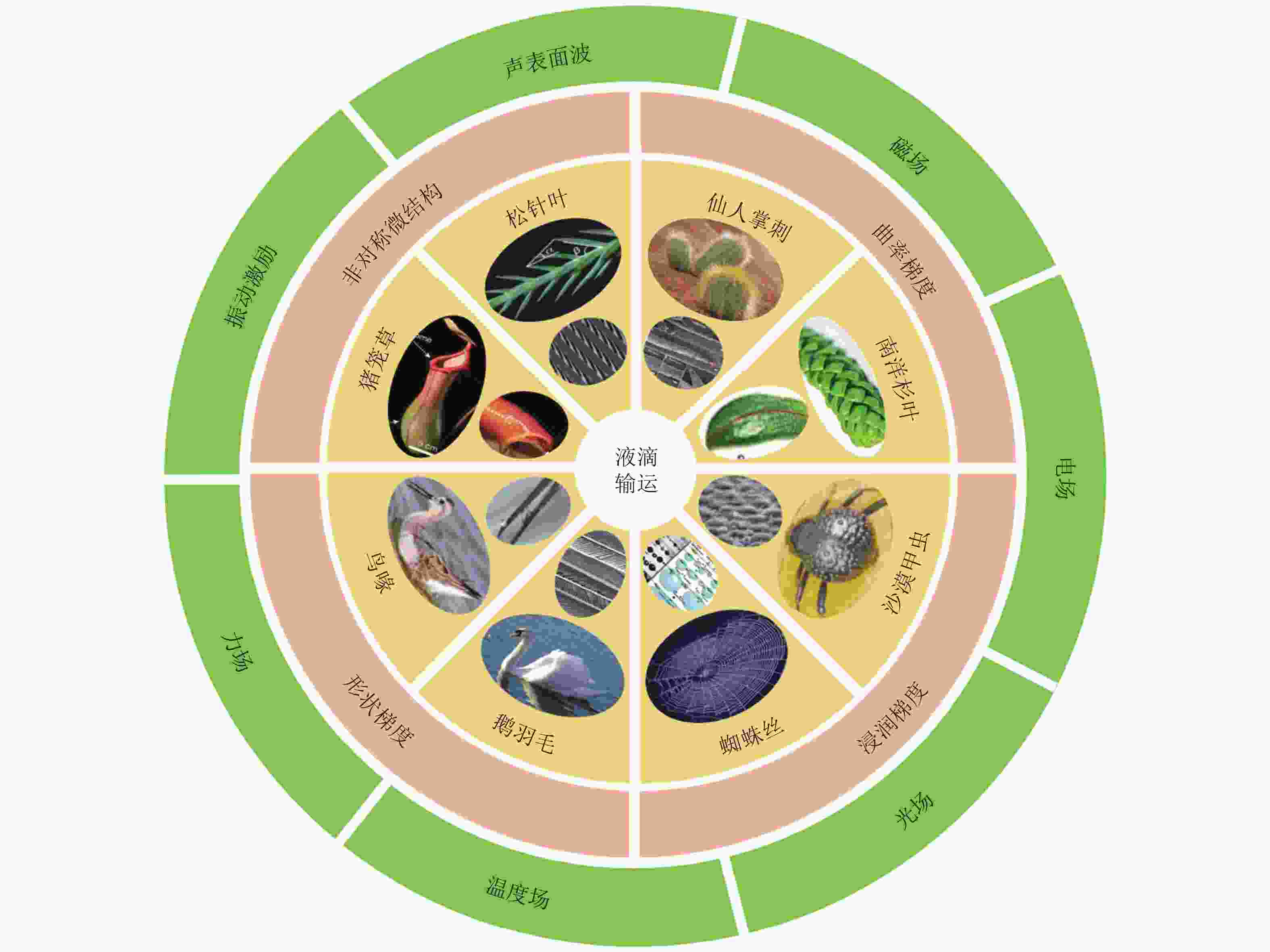
 下载:
下载:
